Namibia is a land of spectacular landscapes, endless skies, barren deserts, rugged mountain ranges and breathtaking wildlife - participants of this self-drive safari experience something of all this.
On this trip you first drive south to the great sand dunes of Sossusvlei and the beautiful Namib desert. The road north then takes you along the fringe of the desert and eventually to the coastal town of Swakopmund. Your next stop is a beautiful lodge in proximity of the Brandberg massif where desert adapted elephants roam and where you can admire rock paintings. The road then turns east to Etosha National Park. You have plenty of time to visit the many waterholes and experience a variety of animals up close. On your way back to Windhoek, Epako Private Reserve is the perfect retreat to fully enjoy your last two days in the wild before returning to Windhoek.
This self-drive journey starts in Windhoek, where you pick up your vehicle. We definitely recommend a first night in Windhoek, which gives you enough time to buy some snacks and water for the trip. Apart from the few paved main roads, most of the roads you drive are gravel roads. Participants in this journey are stirring up a lot of dust! You visit the most beautiful areas of Namibia and experience the entire fascination of this huge country.

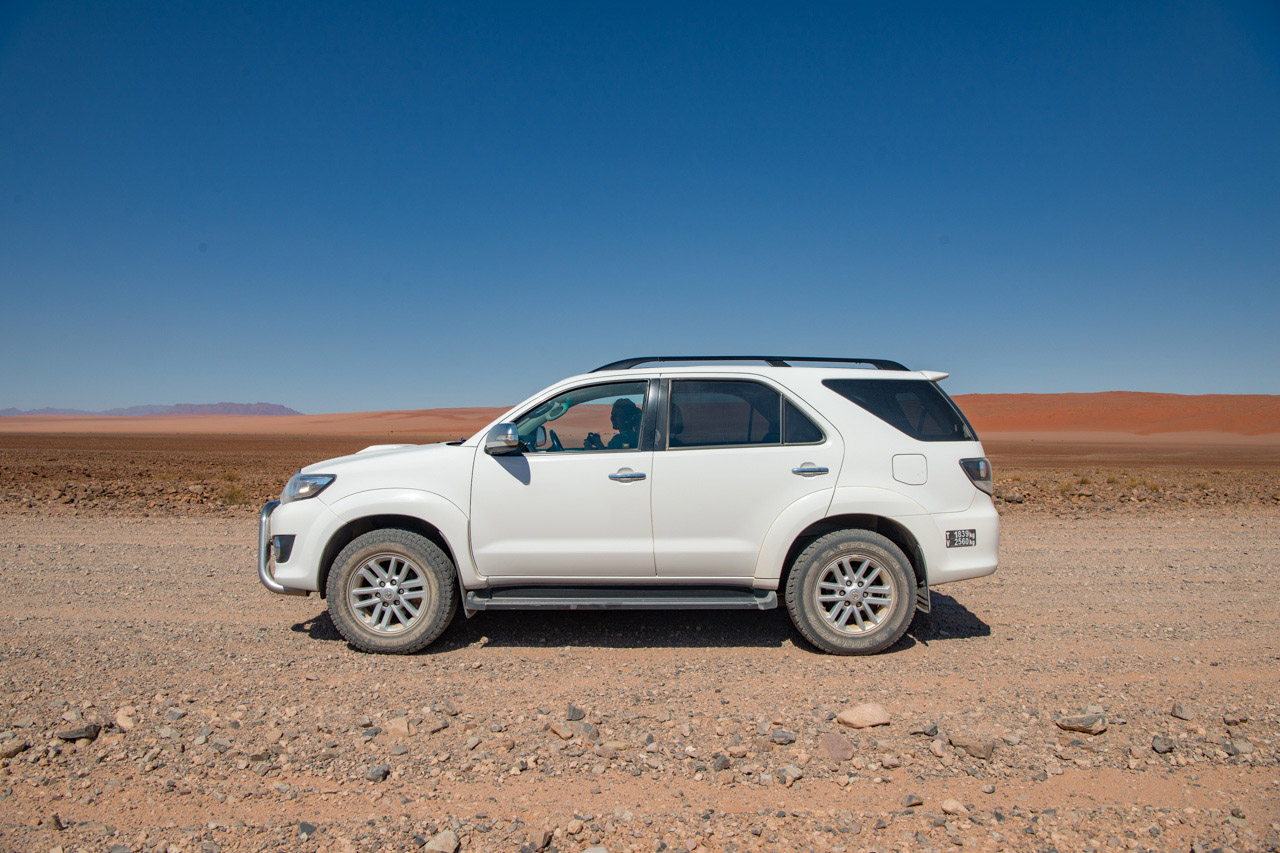

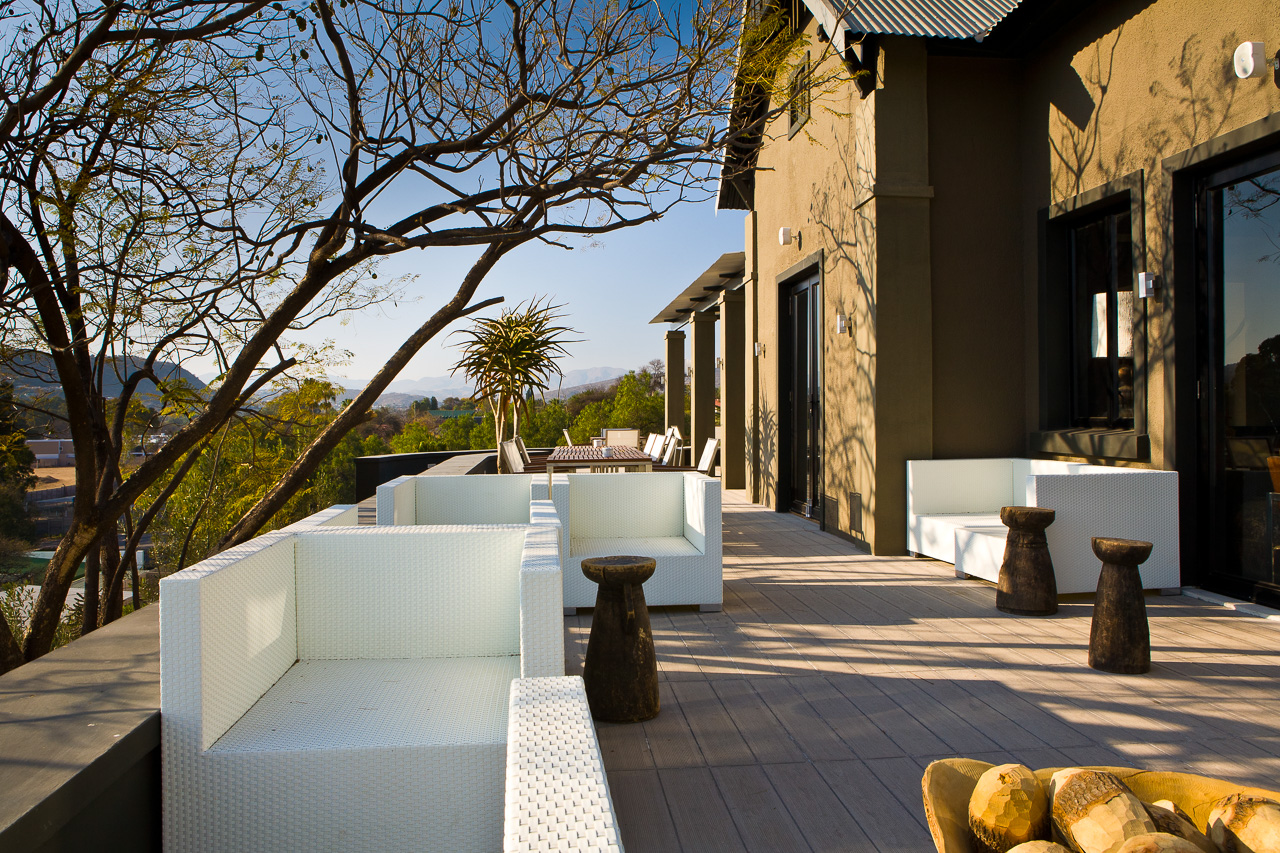
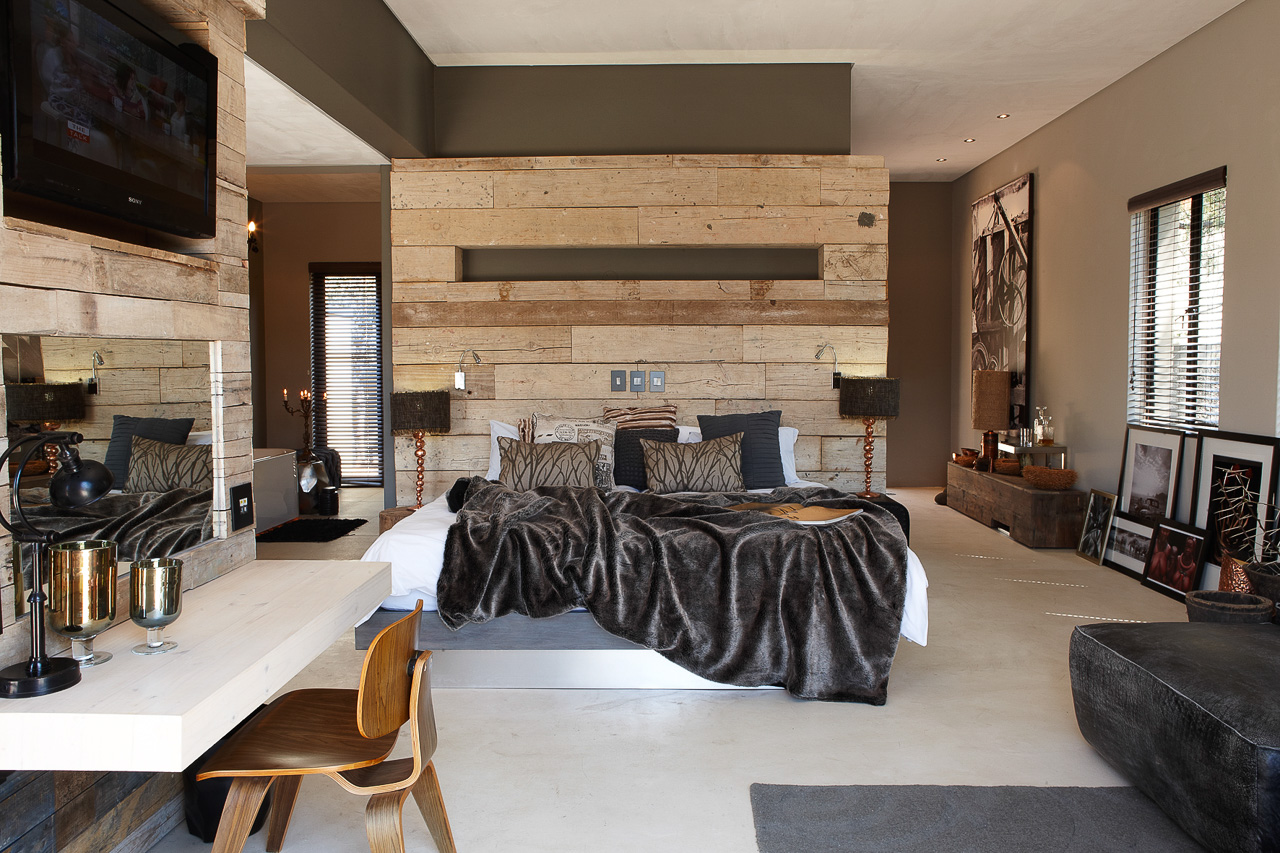
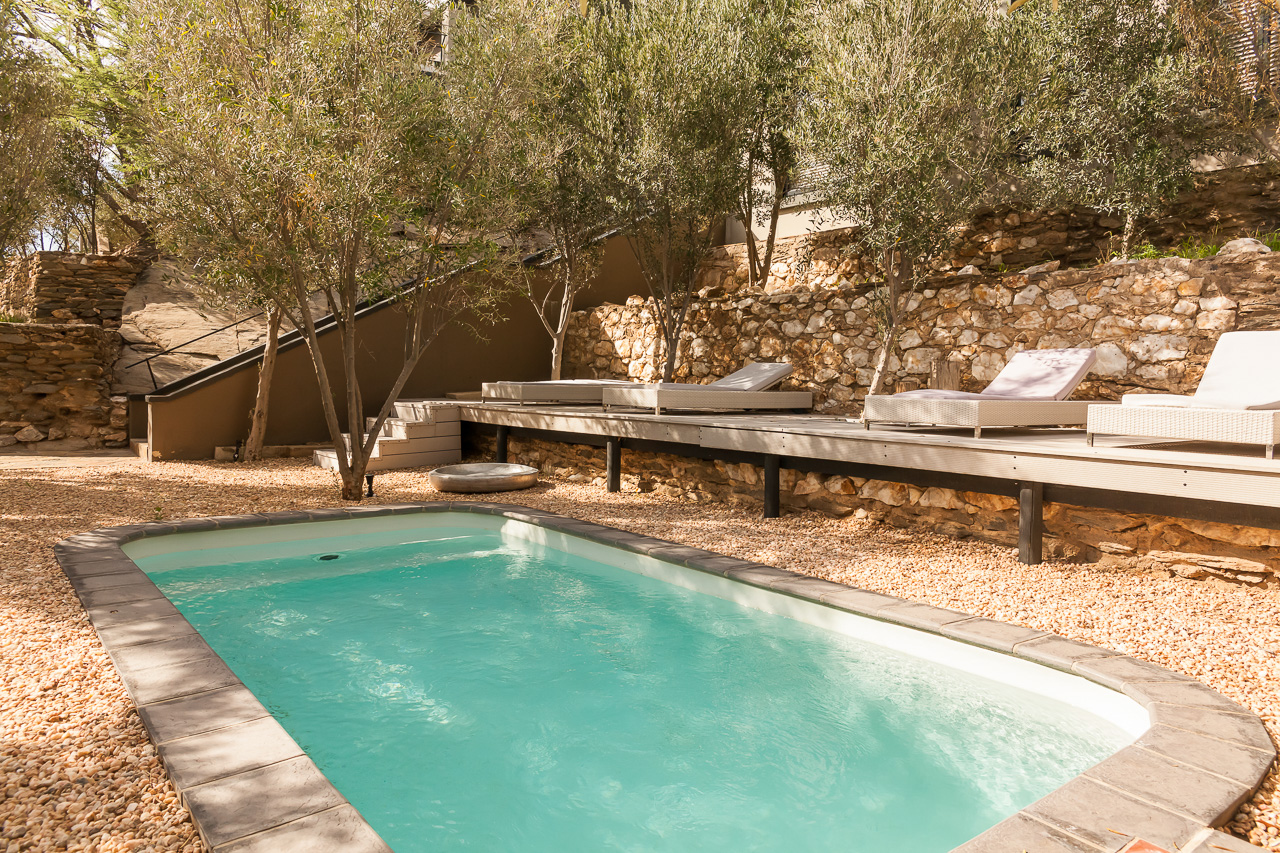
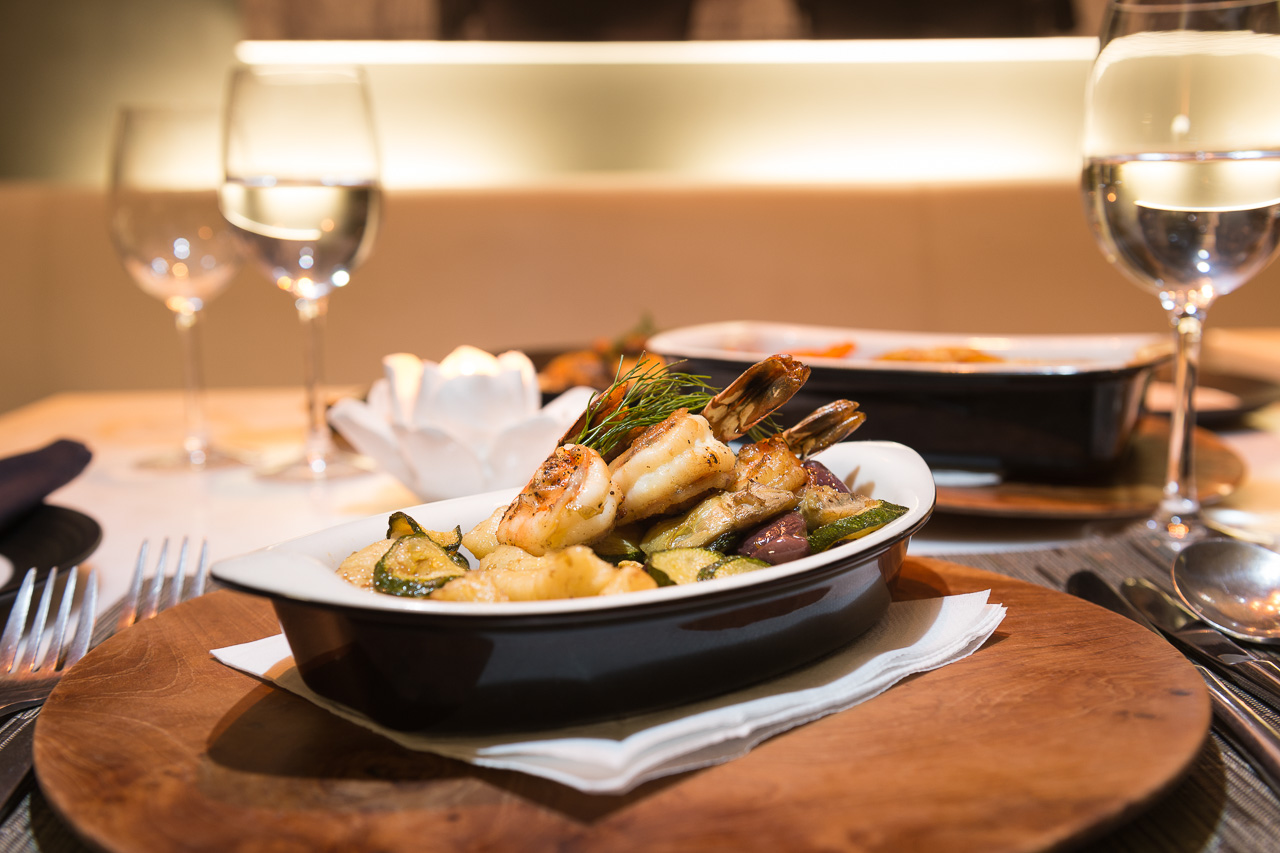
Accommodation With its contemporary style, the Olive Exclusive is a magnificently designed boutique hotel. Its terrace restaurant sits on the highest point of the estate and offers the perfect venue for breakfast. Guests may also choose to take lunch and dinner here, or opt to dine in their own private suite.
The Olive Exclusive is situated on the slope of an olive grove, which means access to accommodation is via several steps. Its seven spacious suites are individually decorated so each reflects a different region of Namibia (e.g. Etosha, Caprivi, Namib etc.). All suites have a bedroom, en-suite bathroom with bathtub, lounge, fireplace, table for in-house dining, minibar with snacks, tea/coffee station, air conditioning/heating, WiFi, safe, TV and HiFi with iPod dock. Each of the four premium suites is further equipped with a private plunge pool.
A large swimming pool provides the perfect place for a cooling dip on those hot days.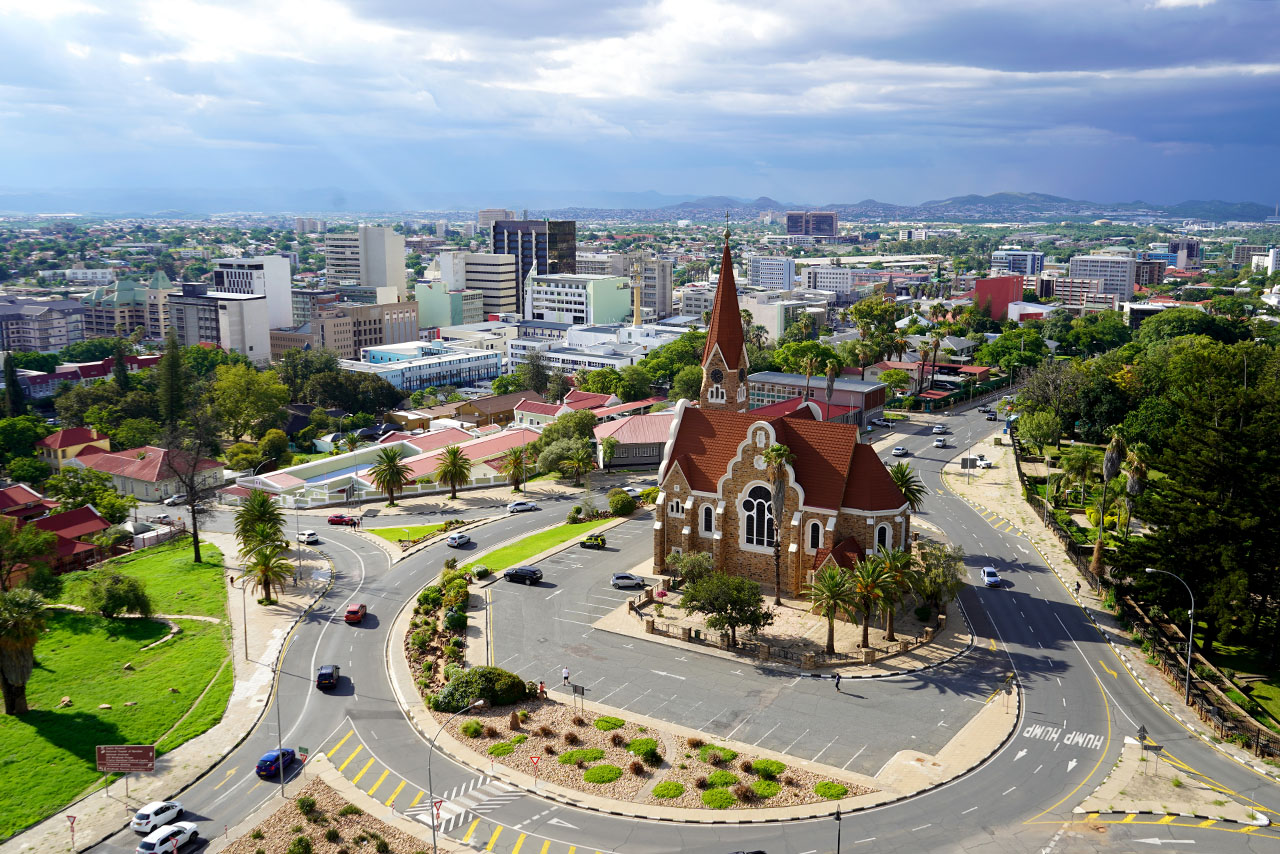
Windhoek is situated in a hilly environment, in the Khomas Highland region, about 1600 m above sea level. The international airport is approx. 1 hours’ drive east, as the city itself has no suitable place for a major airport. It is also served by a small airport (Eros), which is used by lighter aircraft.
The city doesn’t offer enough to warrant remaining for days, but it is the perfect place to spend a night at the beginning or end of a tour, and it is well worth having a look around. Windhoek’s size and straightforward layout means it’s easy for self-drivers to find their way around, and therefore the perfect place to stock up on provisions.

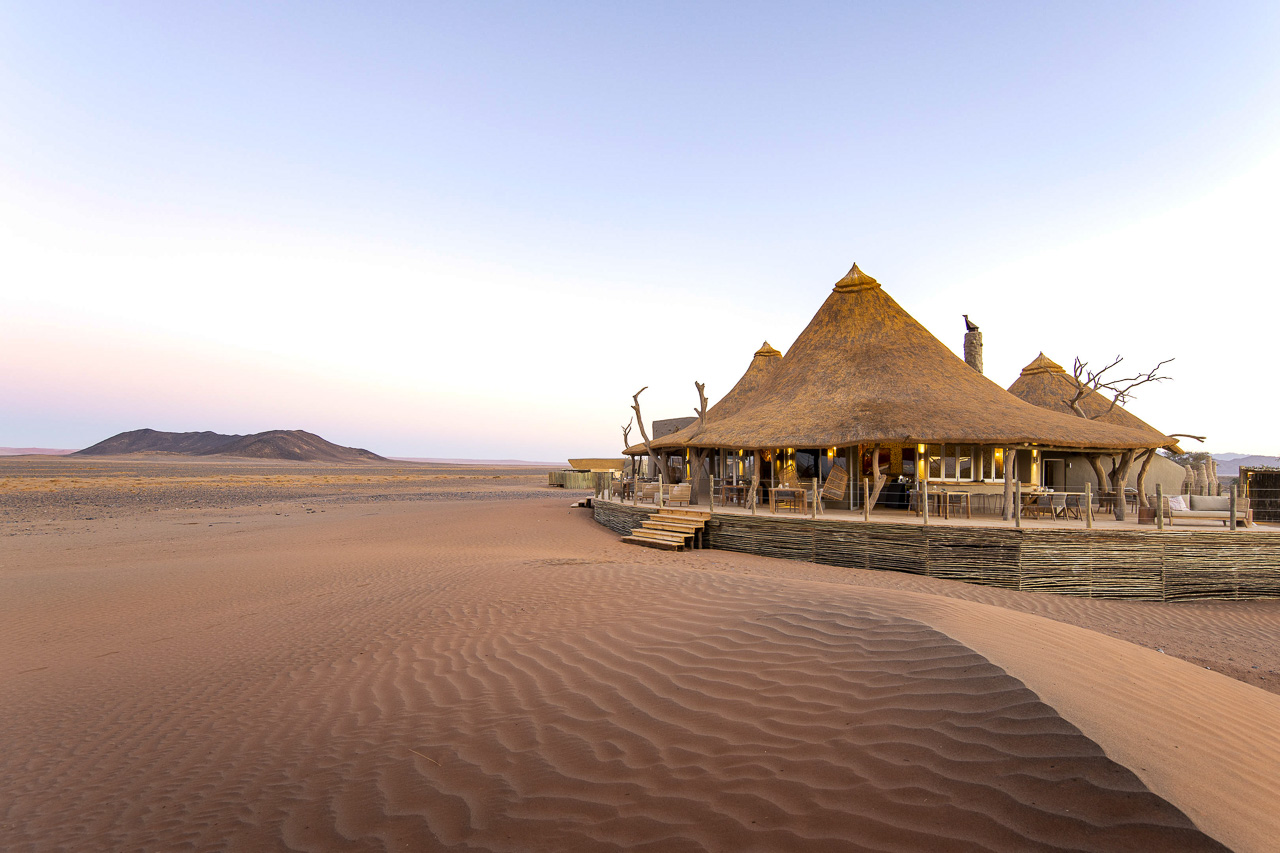
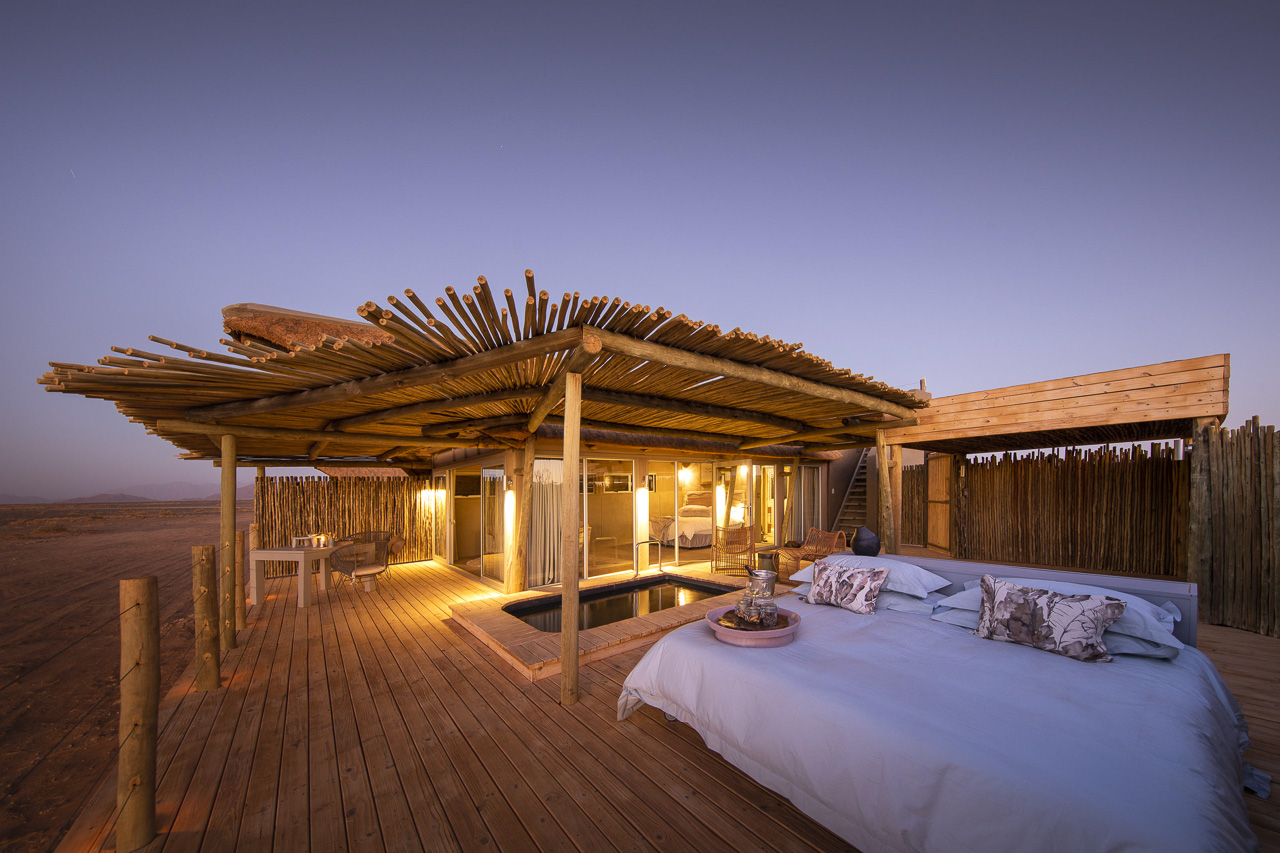
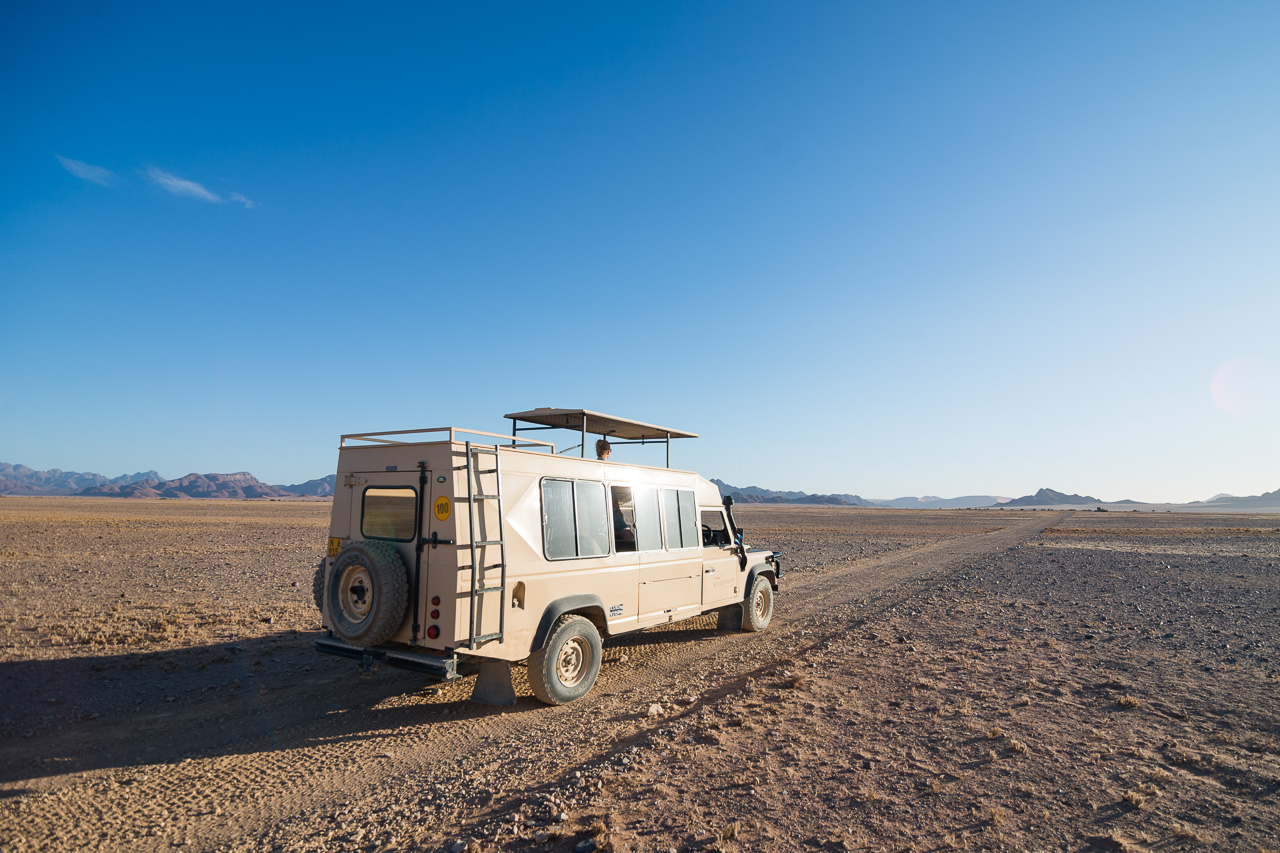
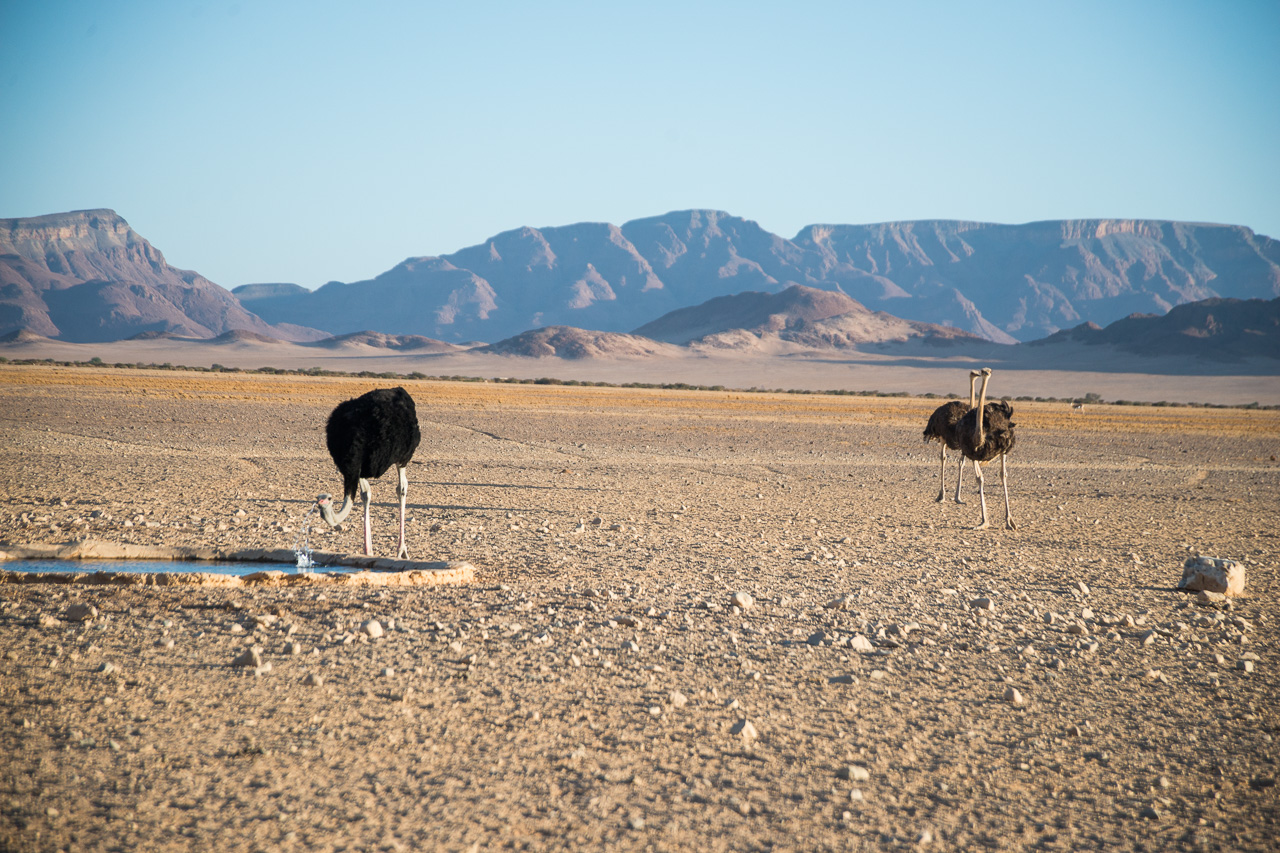
Accommodation
Little Kulala offers eleven climate-controlled rooms (it's very hot in the Namib region from November onwards!) with en-suite facilities, extra outdoor shower, private plunge pool, veranda with outdoor lounge, and a skybed where guests can spend a romantic night under the clear, starry sky.
The camp places great emphasis on natural materials, and the colours of the linen, cotton and mohair fabrics blend seamlessly into the natural surroundings. The Kulala Camps stand out for their fantastic location close to the Sossuvlei dunes and with exclusive access to the park.
Sossusvlei is the area most associated with Namibia: Red dunes as far as the eye can see (up to 380 m high, coloured red by the clay-rich sand) and dead trees in the Vleis or pans, decaying slowly at the will of the arid climate. The Vleis were created by the Tsauchab River, which probably once flowed to the Atlantic some 50 km away. The whole Sossusvlei region is quenched with water during those very rare years when a good amount of rain falls, prompting bushes and flowers to spring up everywhere.
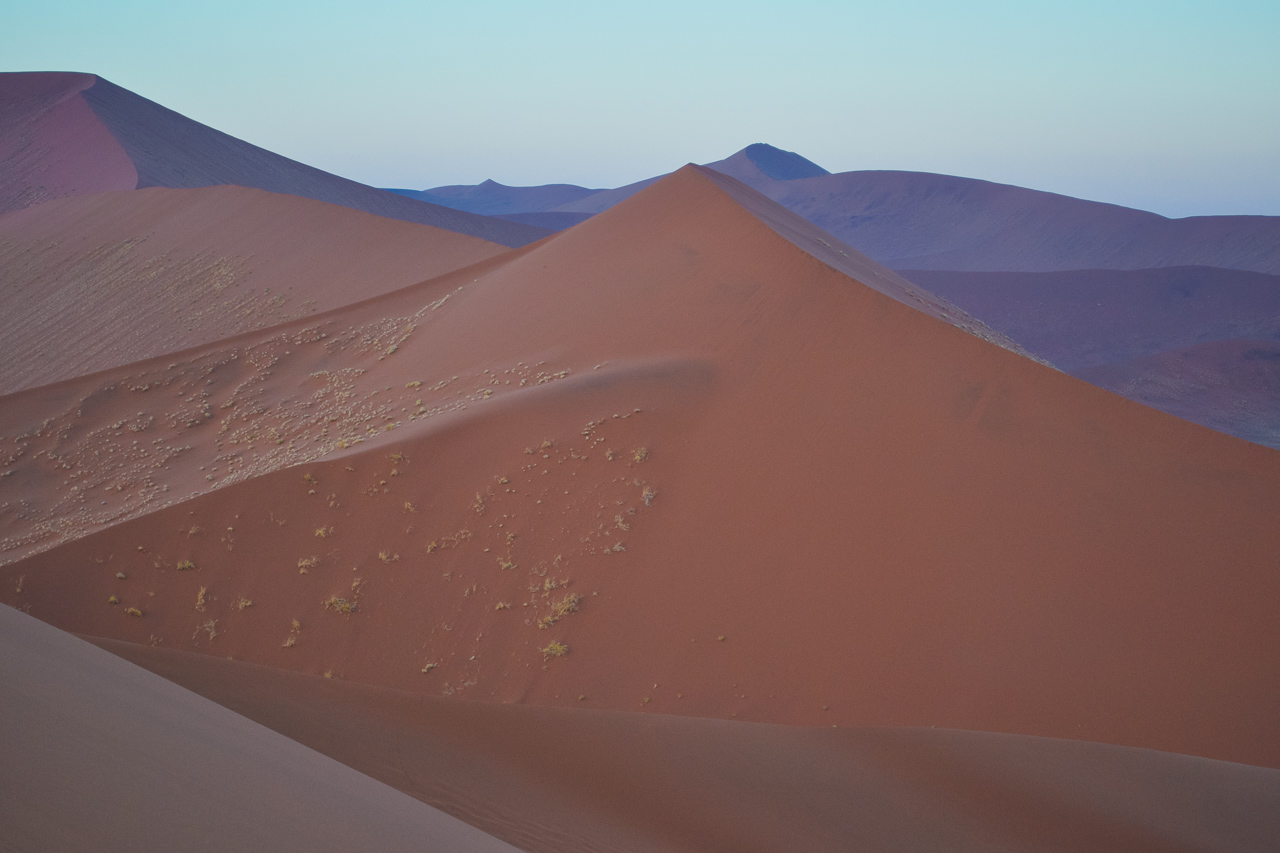
Sossusvlei is also the place most commonly associated with Namibia. Its red dunes stretch as far as the eye can see (up to 380 m high, coloured red by the clay-rich sand) and the desiccated trees in the vleis (salt and clay pans), which decay slowly due to the arid environment, are typical of the region. The vleis were created by the Tsauchab River, which most probably flowed into the Atlantic 50 km away. Very rarely, a torrential downpour will see the vleis disappear under water – a spectacle that very few get to see. .
The Namib itself is a product of the Orange River in the south, which carries the red sand of the Kalahari to the ocean. The Benguela Current takes the sand north, where the prevailing winds have blown it back inland over millions of years, forming the Namib Desert.
Sossusvlei is situated in the Namib Naukluft Park and thus subject to very strict regulations. The park opens its gates at sunrise and all visitors are required to leave again by sunset. The distance between the park entrance and the Sossusvlei car park, however, is a good 60 km, most of which is tarred. From here it’s only possible to reach the second car park, right next to the Sossusvlei, in a 4x4, on foot or using the shuttle service. There are also other vleis in the area in addition to the Sossusvlei, including Dead Vlei, with its famous dead trees, and somewhat further away, the so-called Hidden Vlei, which requires a good trek to get to.
The most famous dunes are Dune 45 (170 m high), which is located 45 km from the entrance to Sossusvlei, and then Big Daddy, the largest dune, and his partner, Big Mama. Visitors are of course allowed to scale the dunes, and the effort is worth it. The way up is quite strenuous – but this also means that the way down is easy!
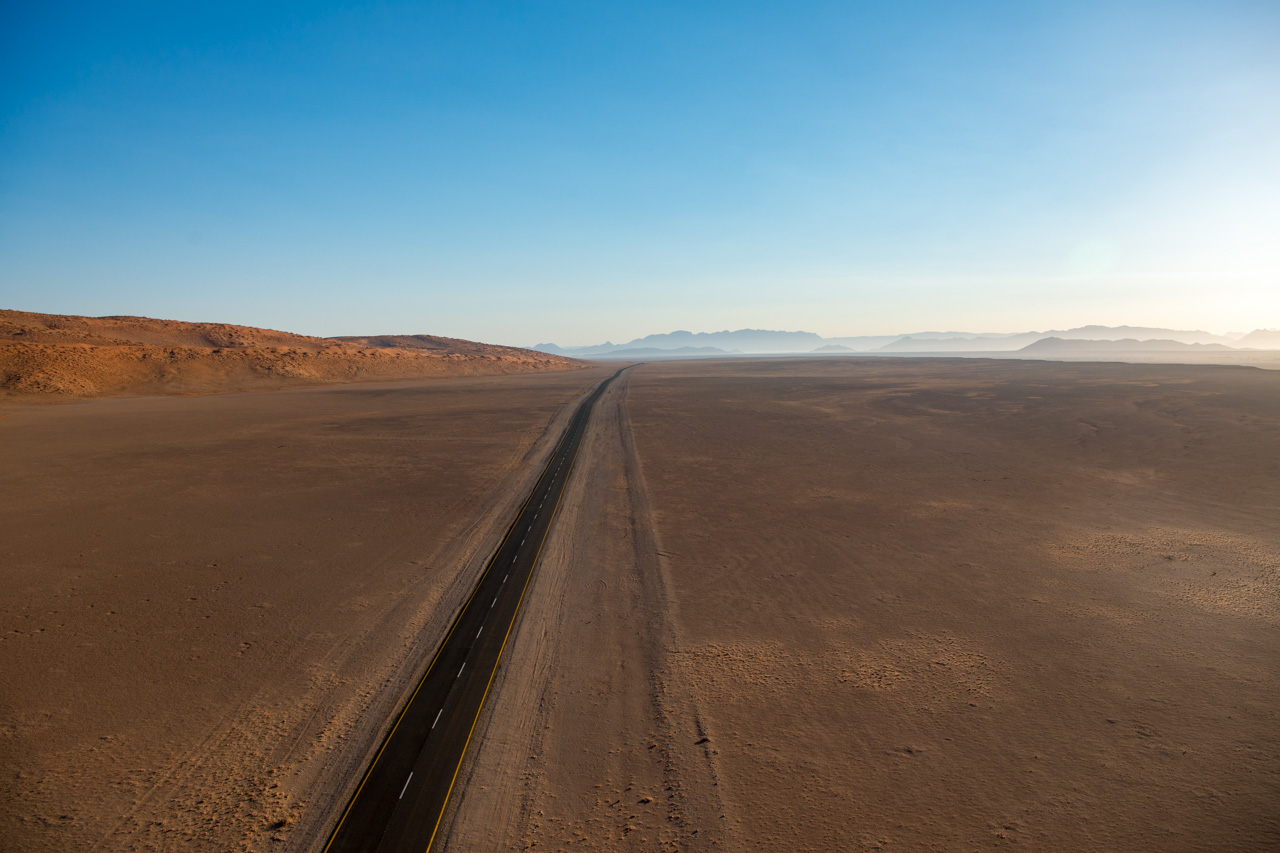
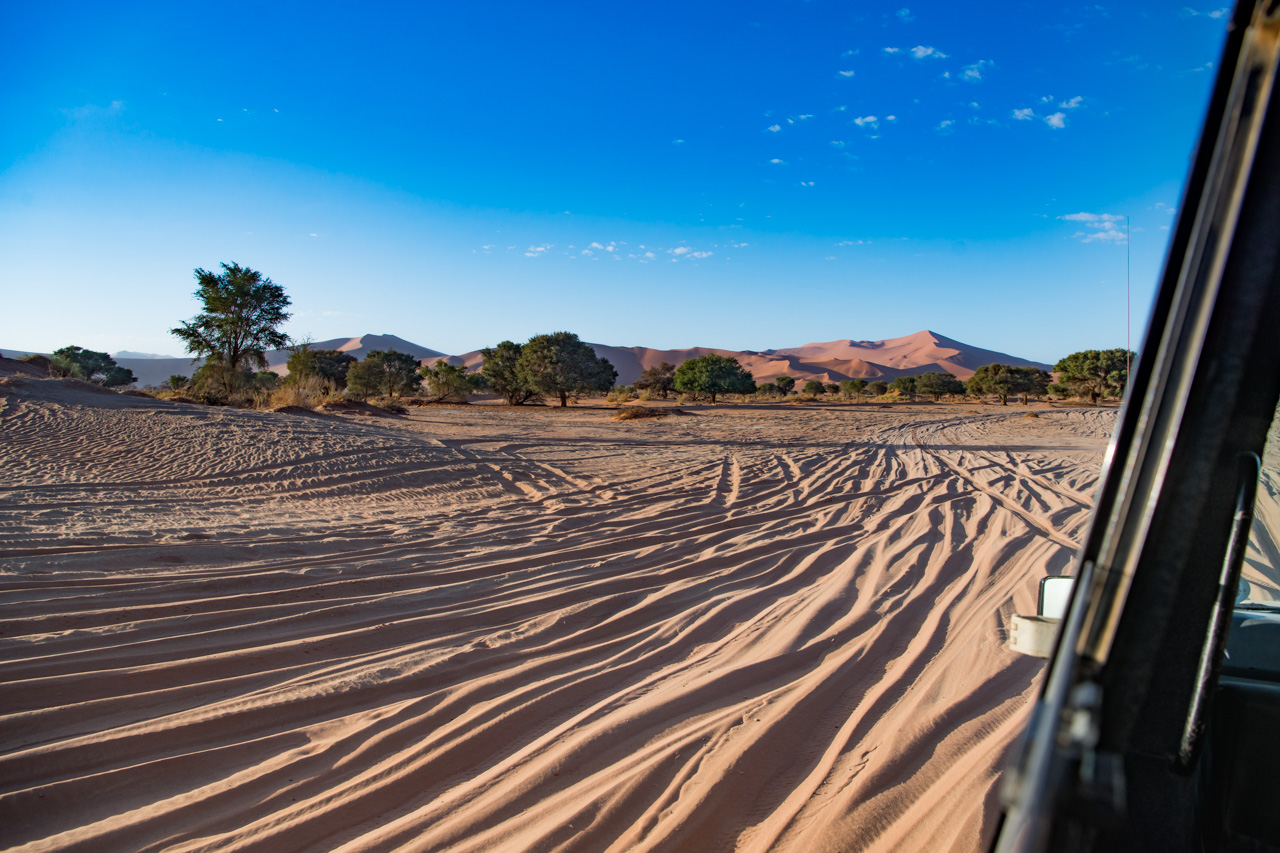
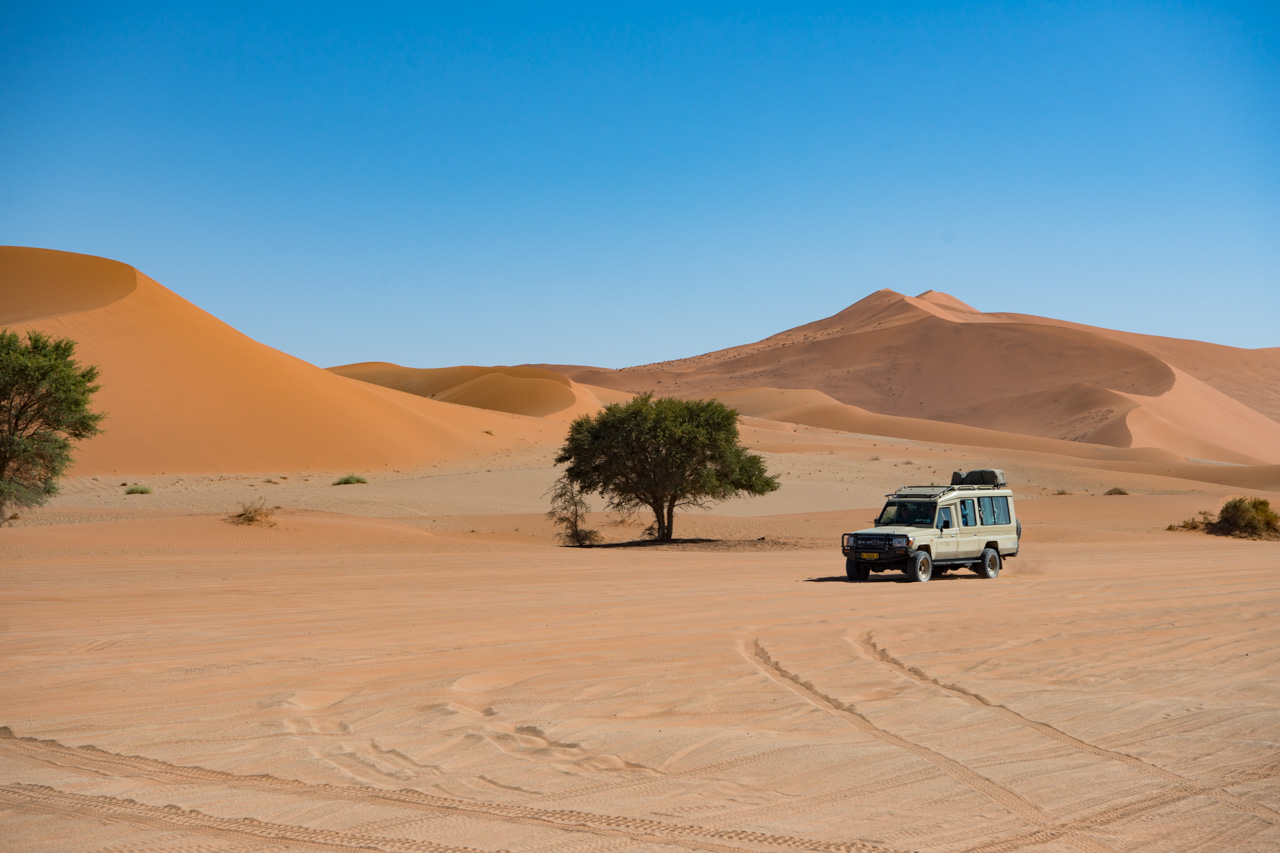

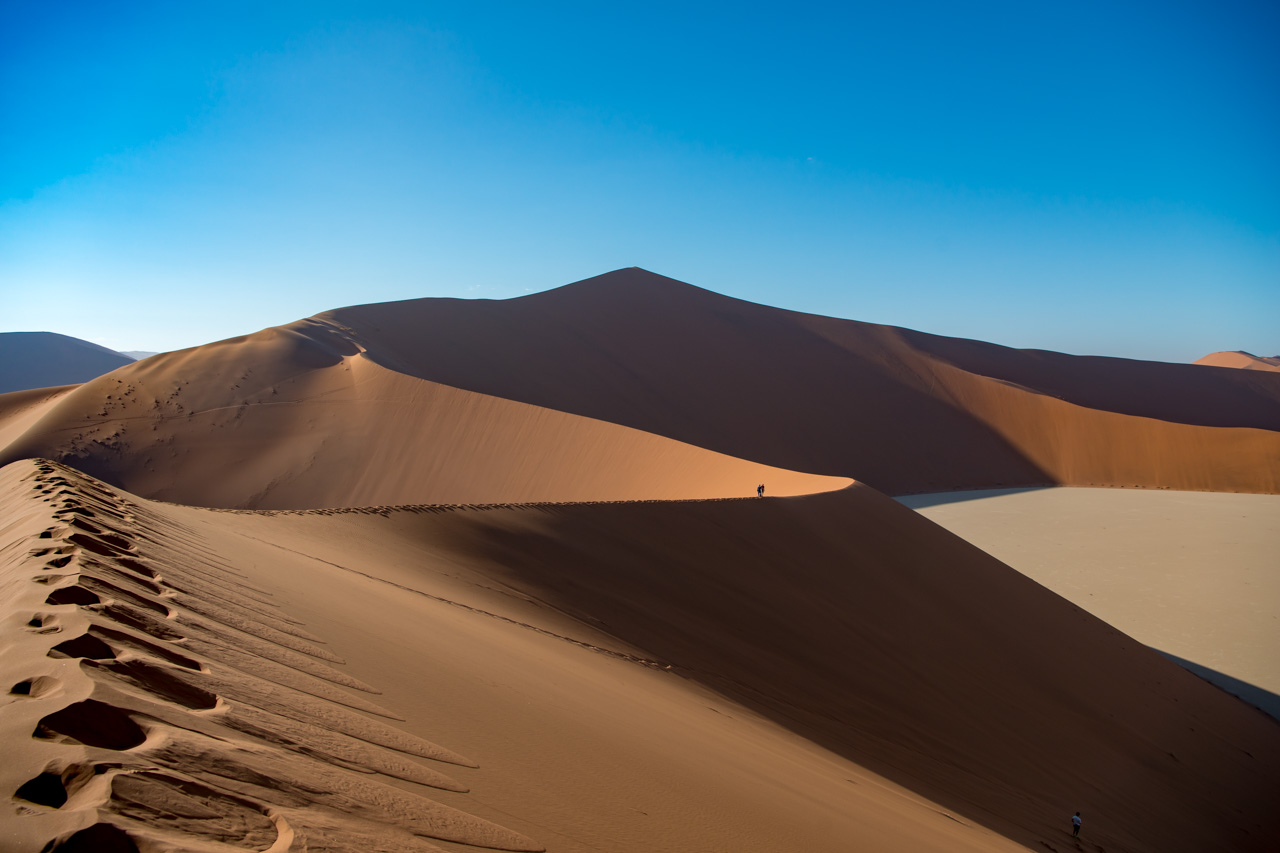
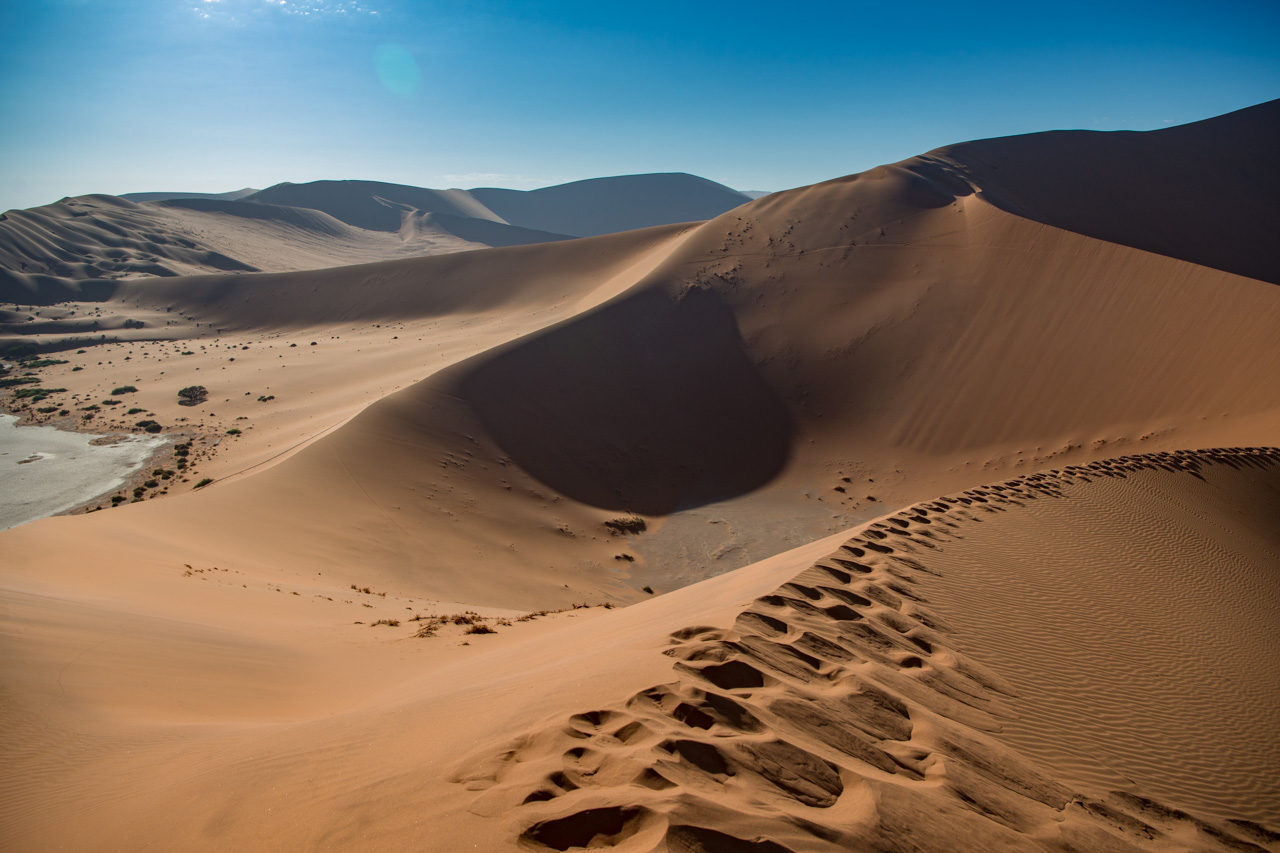
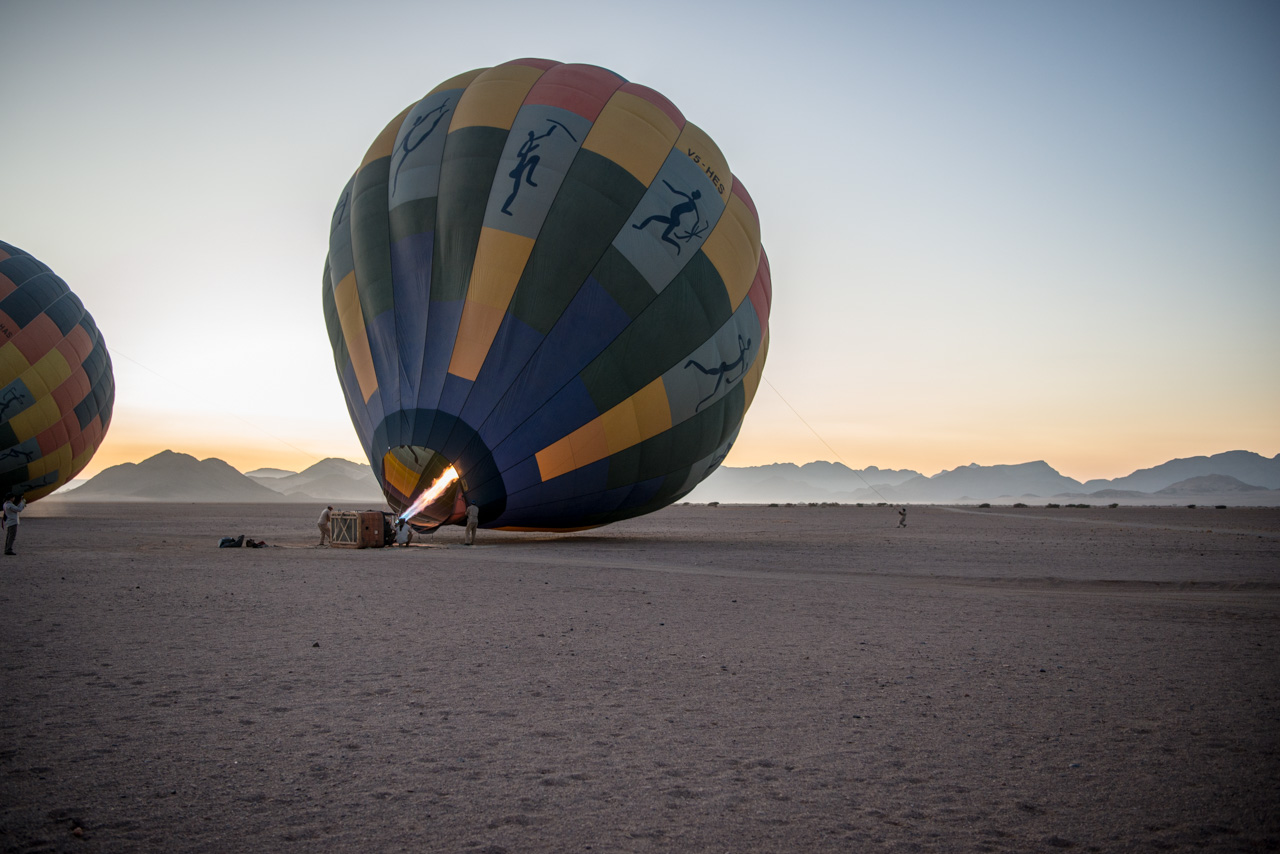

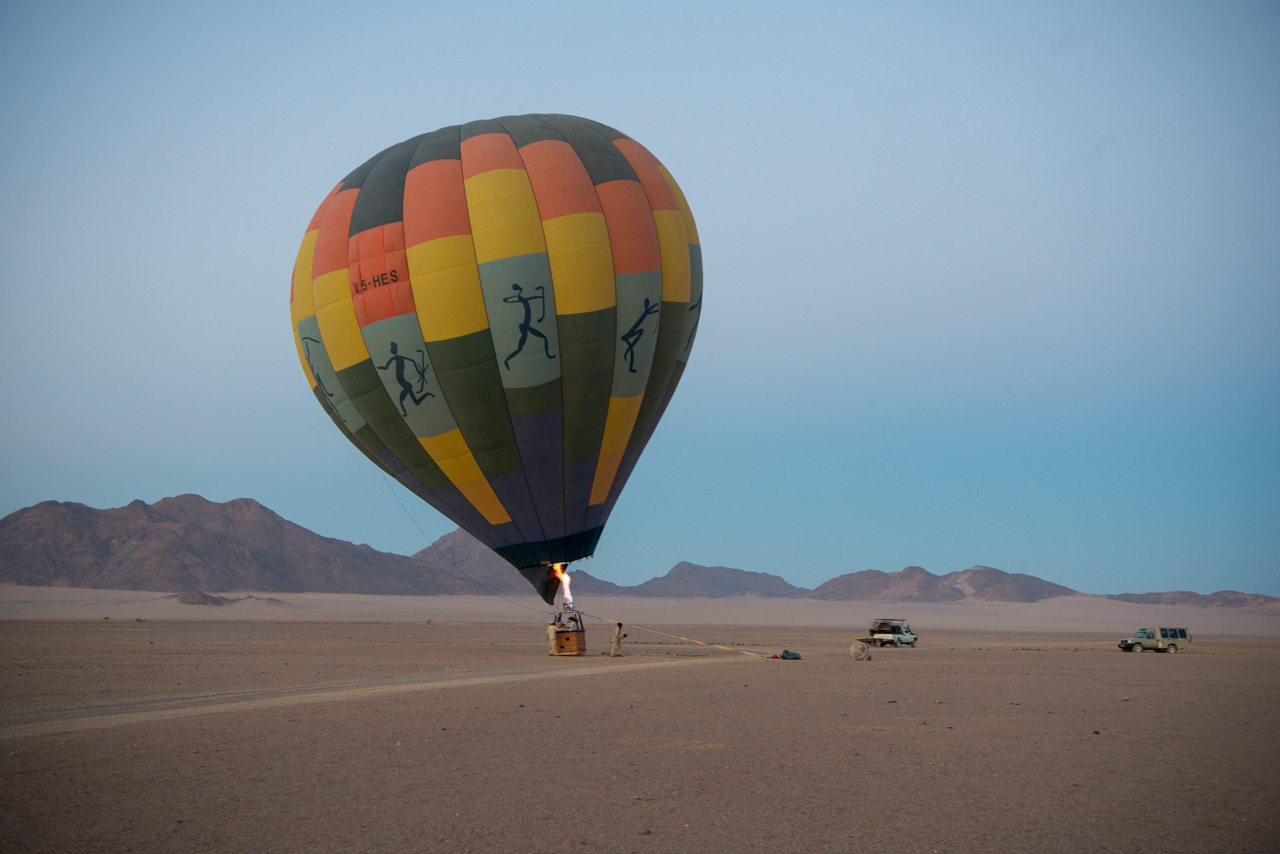
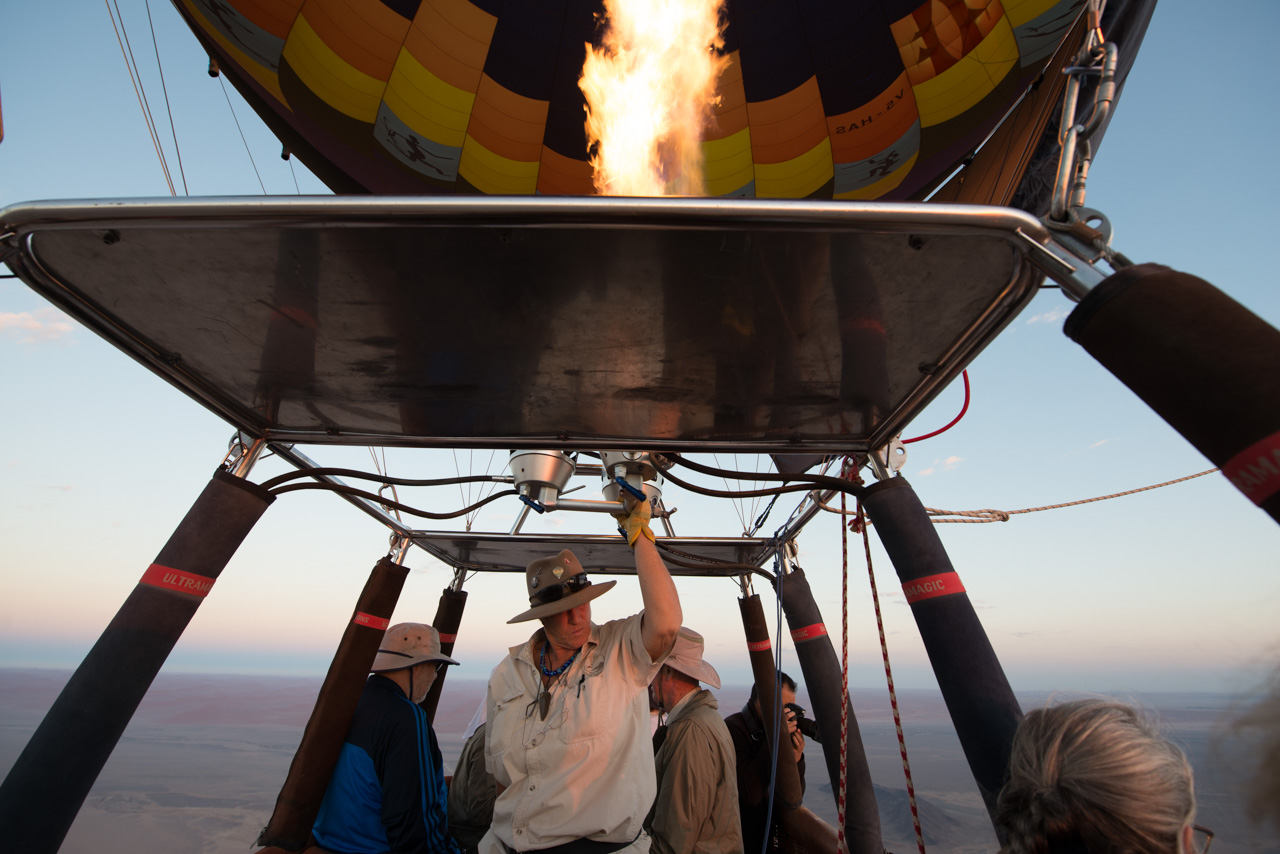
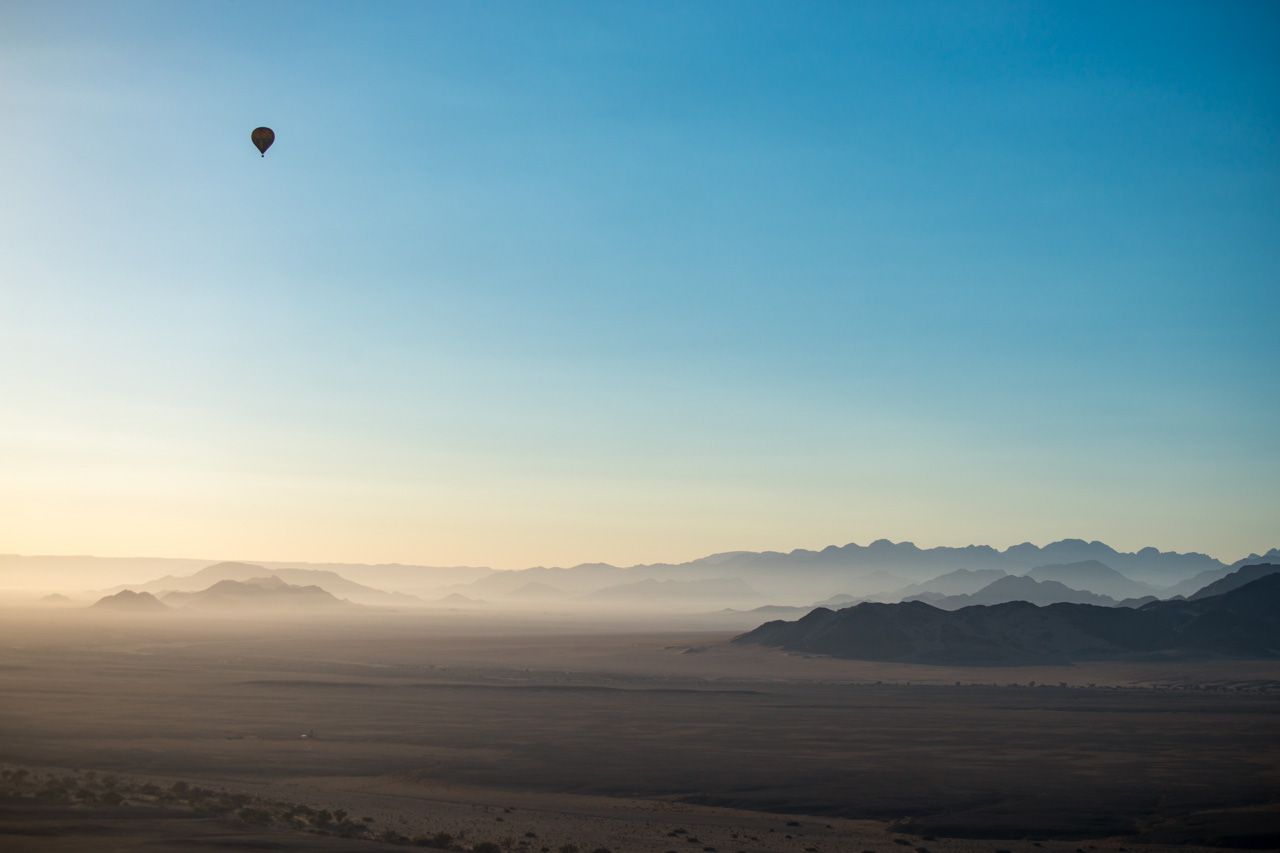
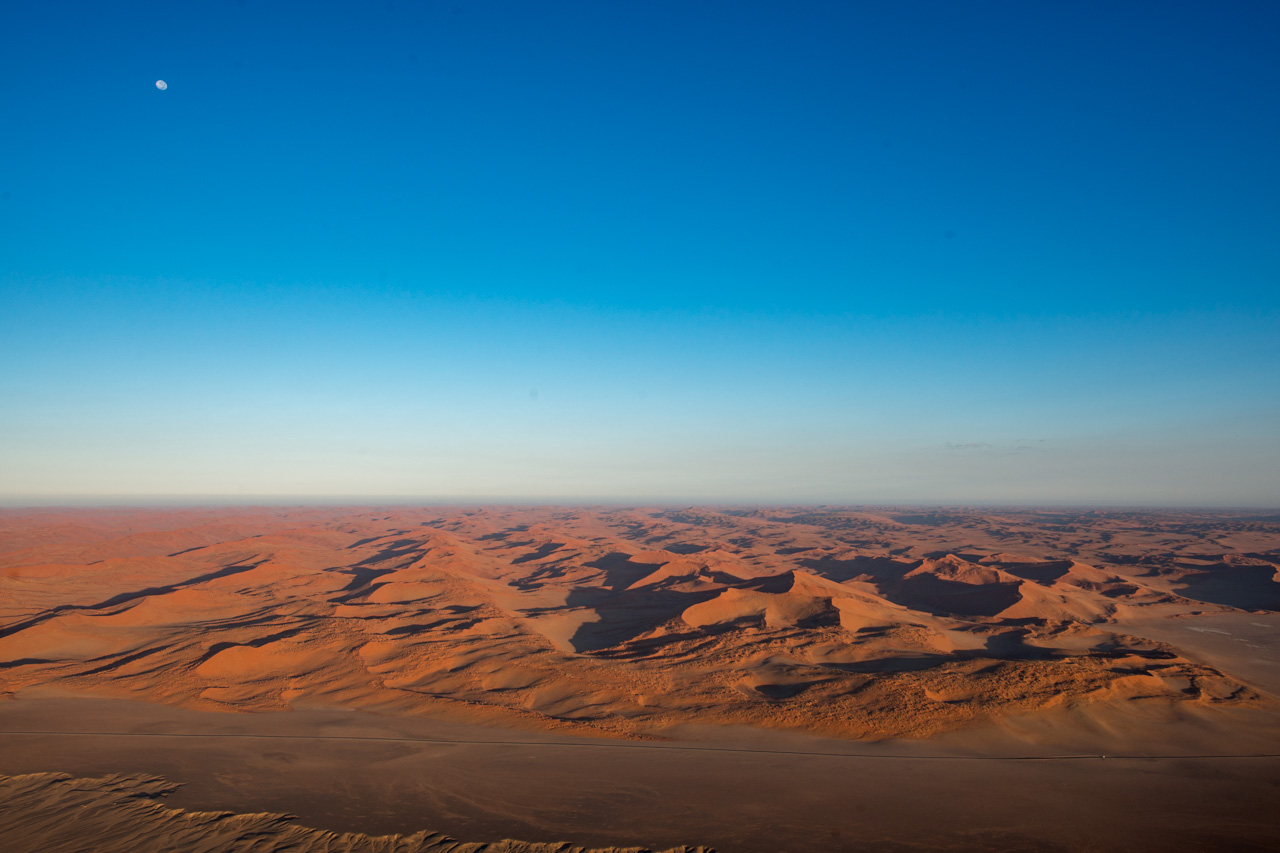
On landing (wherever the wind has taken you) there is a champagne breakfast waiting for you.

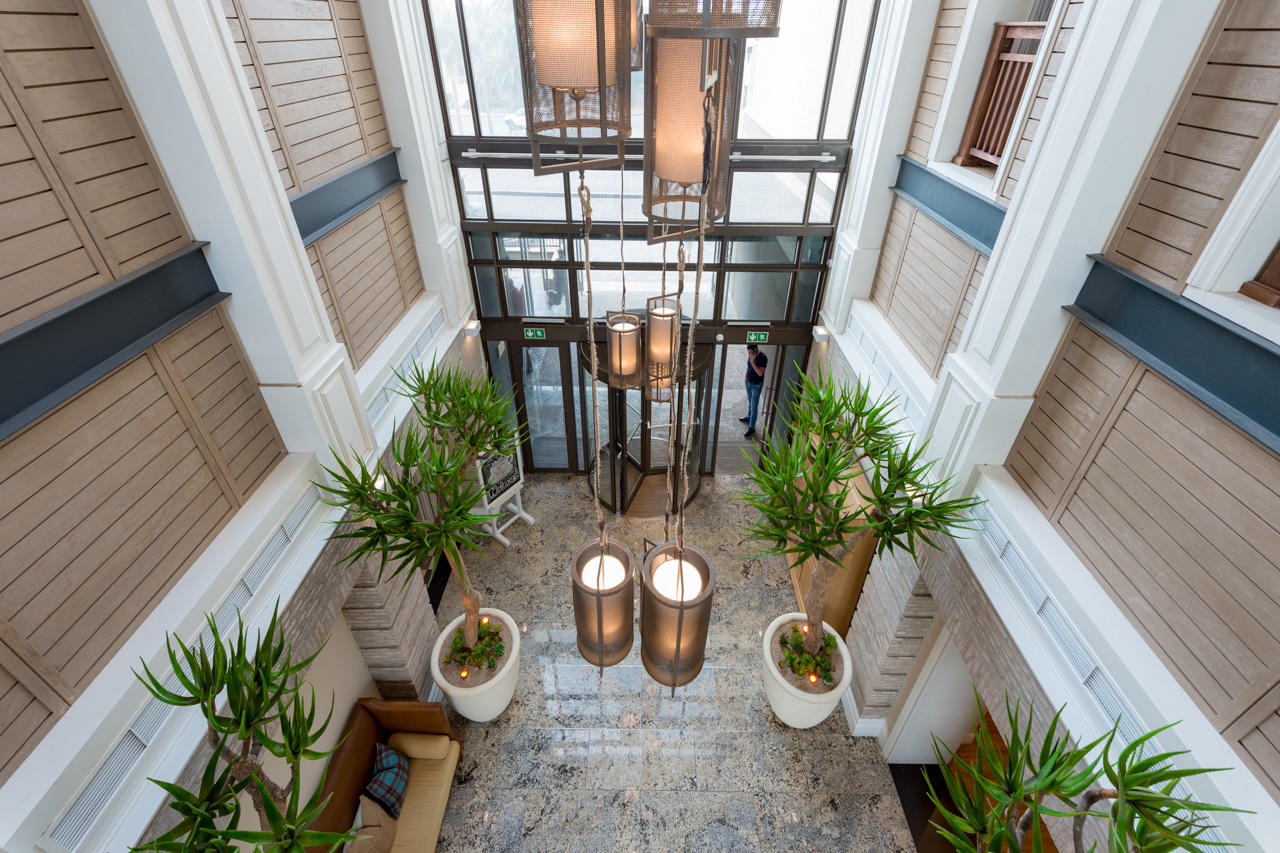
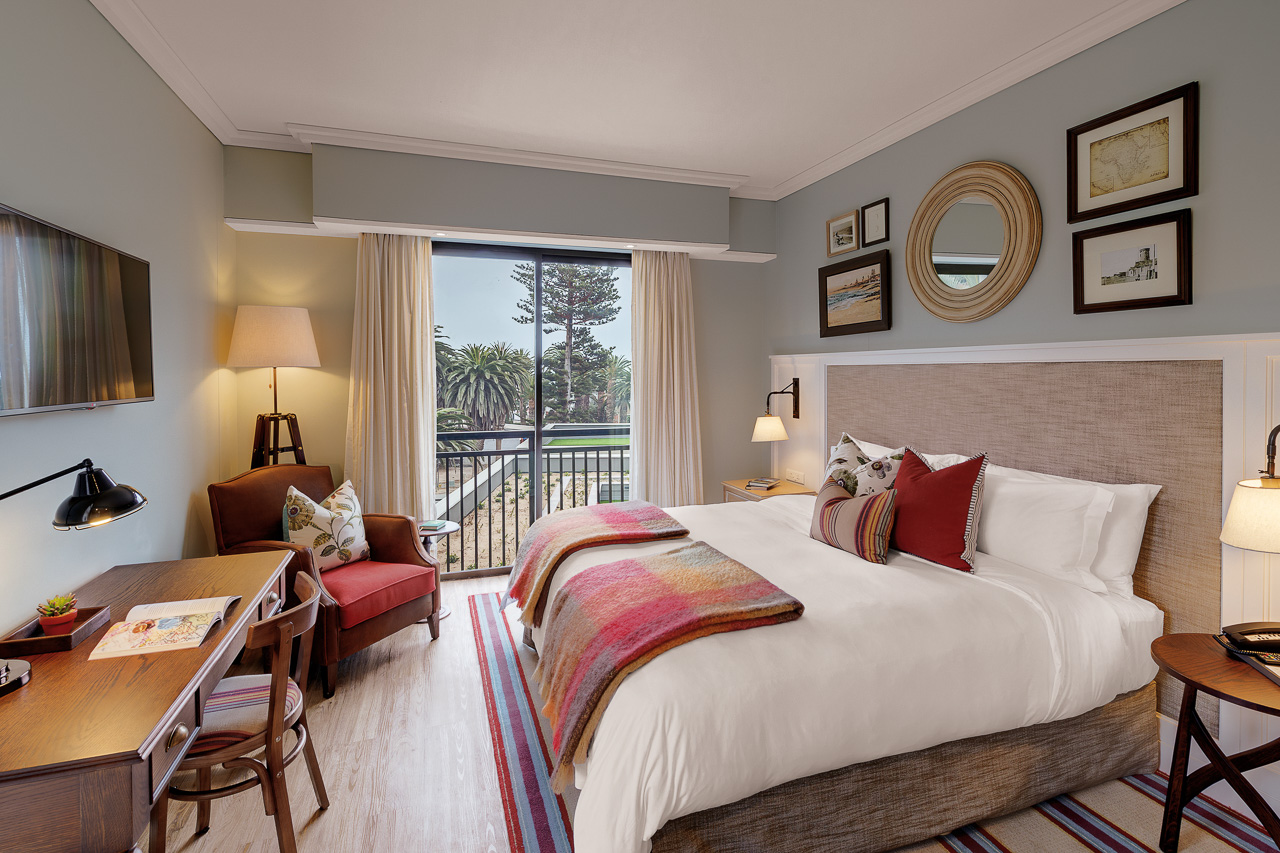
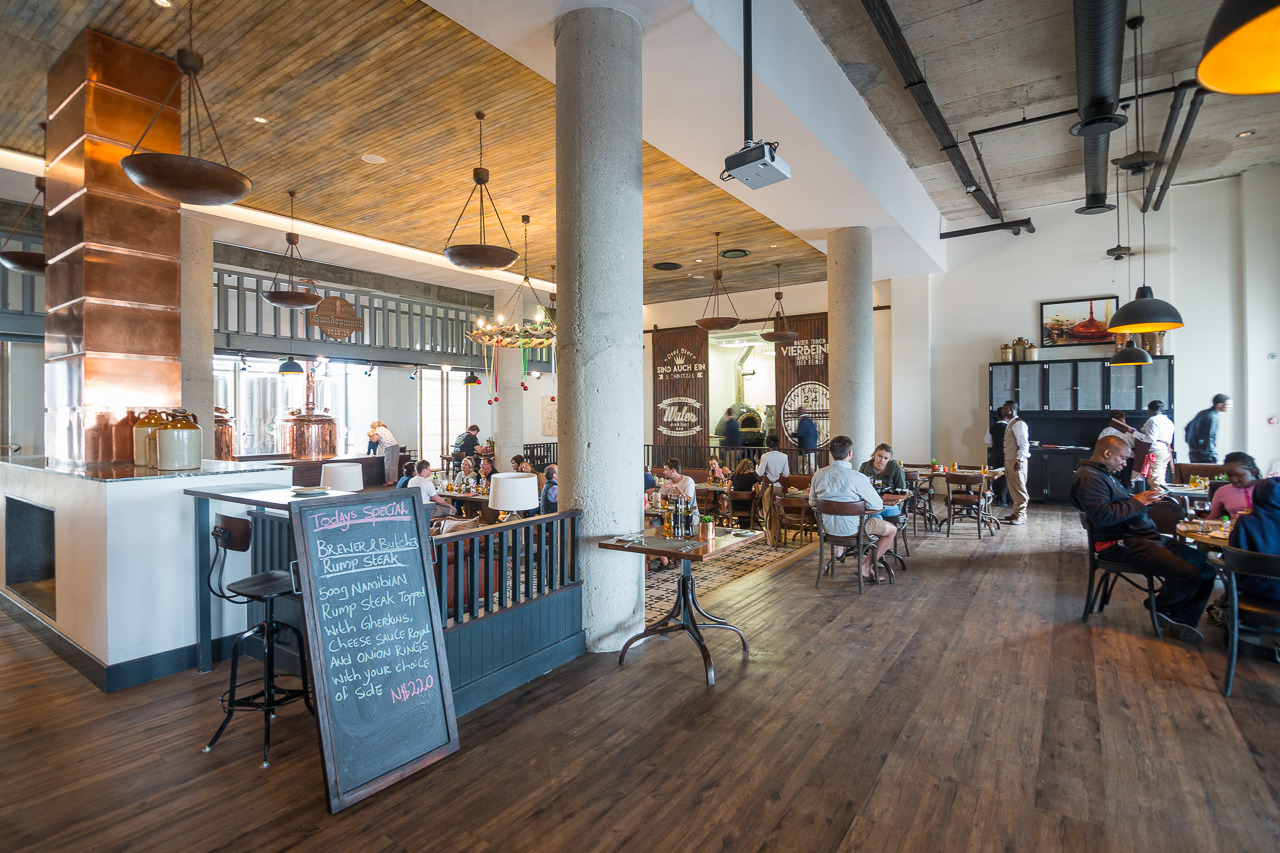
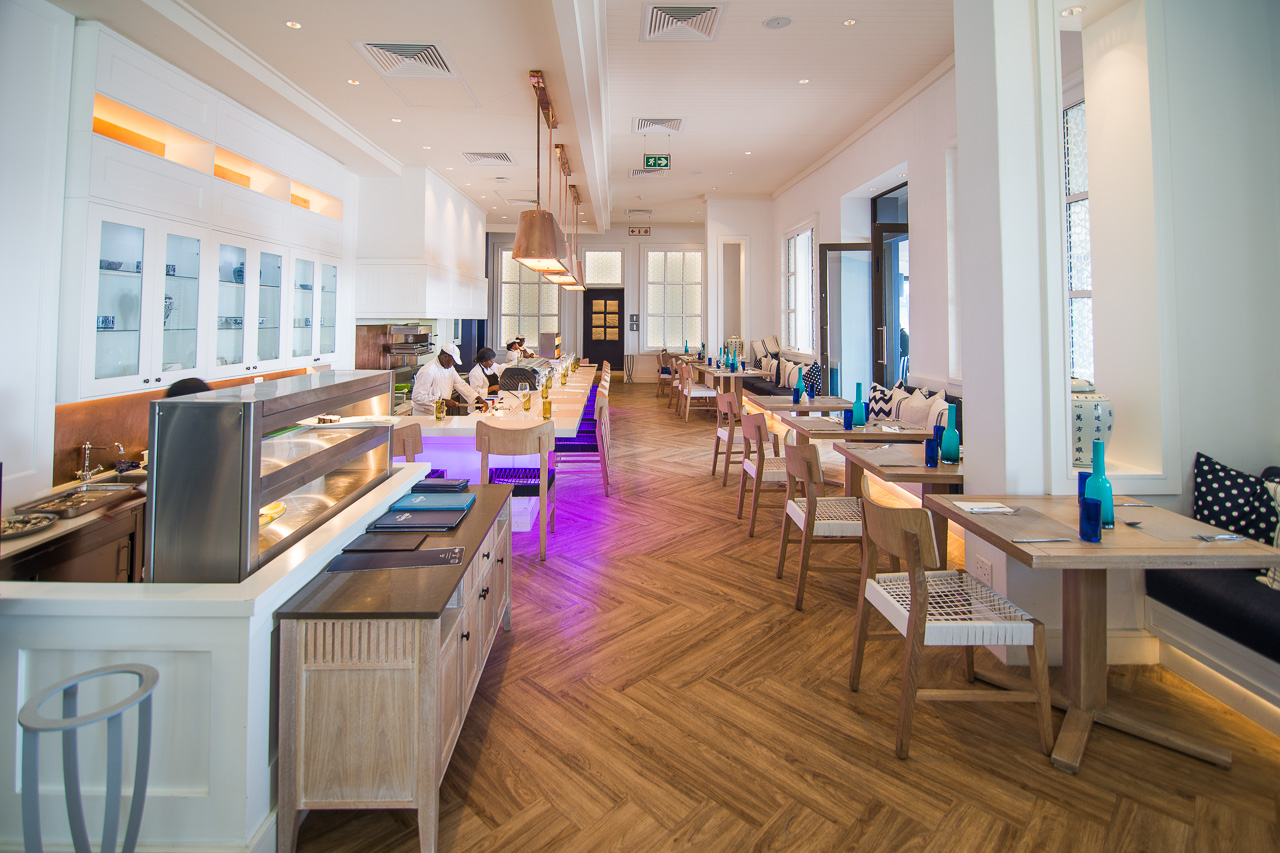
Accommodation The new Strand Hotel has set a new standard in Swakopmund. Uniquely located on the iconic and historic Swakopmund Mole and surrounded on three sides by the Southern Atlantic Ocean its 125 rooms and suites make this hotel one of the larger ones in town, but of those certainly the one with the best seaside location. All rooms have tea & coffee stations, mini-bars, hair-dryers, TV’s, free Wi-Fi Internet access, telephones and air-conditioning.
The Strand Hotel offers its residential guests and all casual visitors three exciting restaurants. The Farmhouse Deli is good for coffee, cake, sandwiches and fresh salads. The Brewer & Butcher welcomes beer and meat lovers. The Ocean Cellar caters for guests who prefer seafood, sushi, oyster and a glass of fine white wine.
The Strand Hotel is destined to become the social epicenter of Swakopmund for locals and tourists alike.
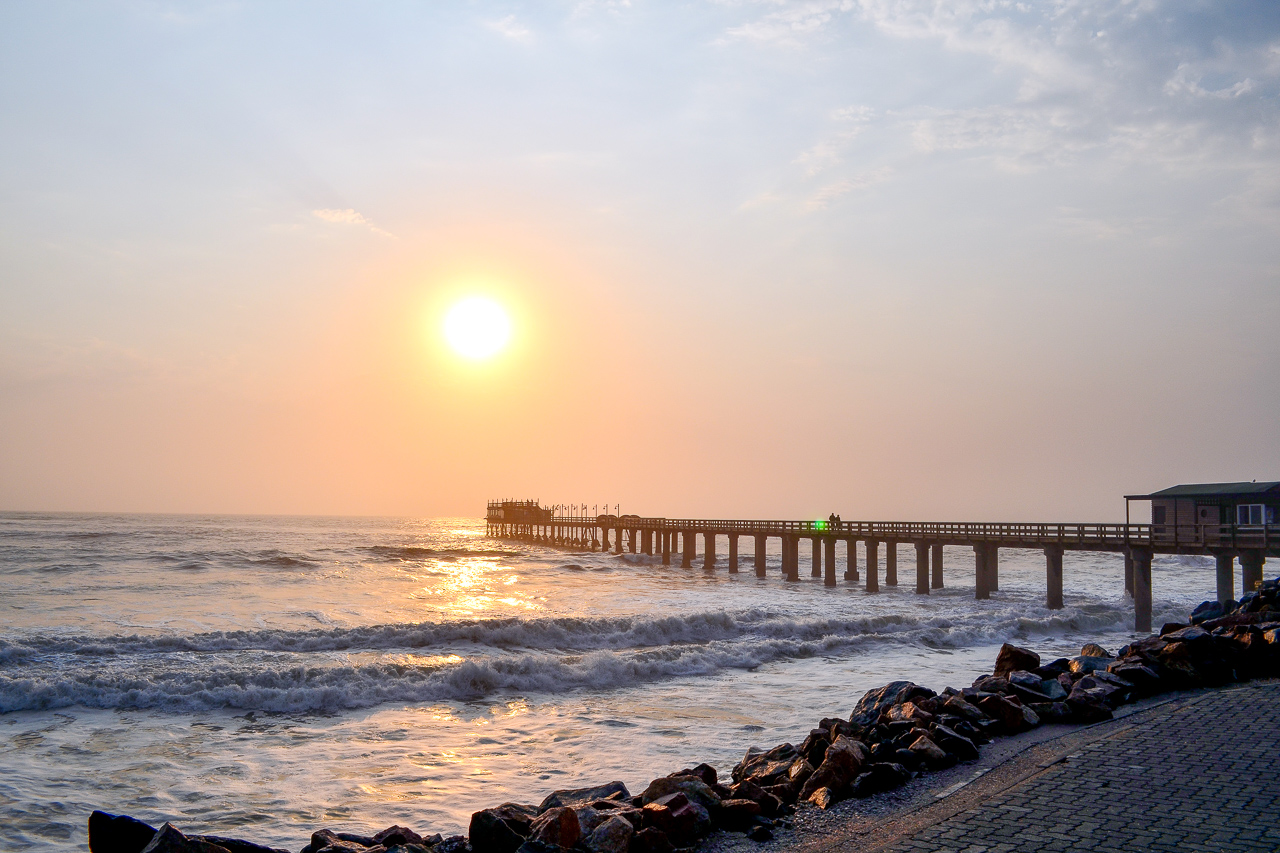
Swakopmund was the centre of German colonial rule, and relics of this chapter of its history can be found around every corner. Most noticeable of these is the long jetty, which stands witness to the German’s activities in this area and their attempt to create a usable port. Unfortunately, Swakopmund turned out to be wholly unsuitable for the task. Walvis Bay is a natural bay just 30 km south. It was occupied by the English as early as 1795, and later became a fish-processing industrial town under South African rule.
Swakopmund is charming. The old part of town is very pretty and offers several cafes, bakeries and, of course, the unavoidable beer houses. Time appears to have stood still in many parts, and it’s difficult not to keep rubbing your eyes in wonderment at the mix of German and African.
There’s a lot to do if you stay at Swakopmund: take a day trip southwards along the coast to Sandwich Harbour, hop on a boat at Walvis Bay and wait for the seals and pelicans to greet you, Kayak with seals, jump on a quad bike for a ride through the dunes, or just take a stroll along the beach and enjoy a tasty meal in one of the great restaurants. Swakopmund’s most famous landmark, the jetty, has been renovated and now boasts the appropriately named ‘Jetty 1905’ restaurant at its end.

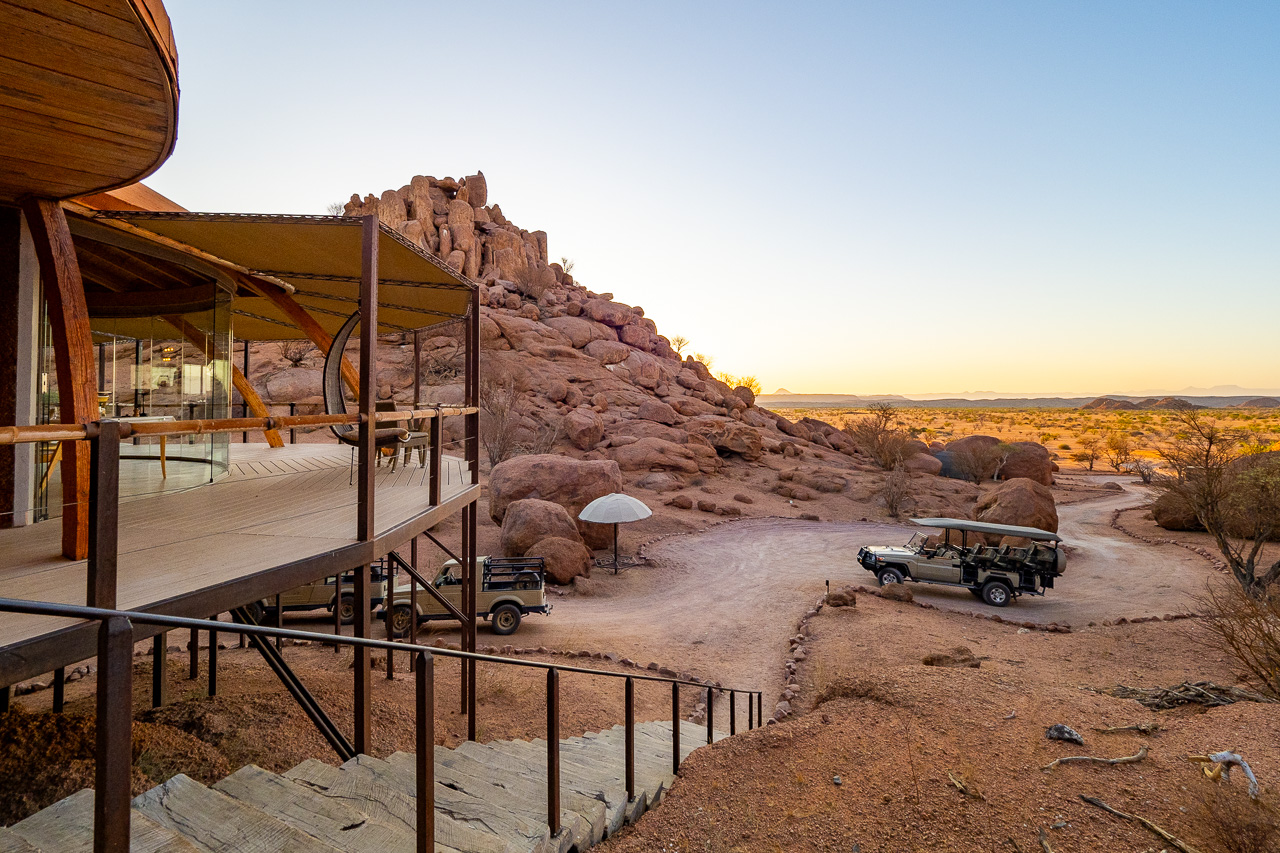
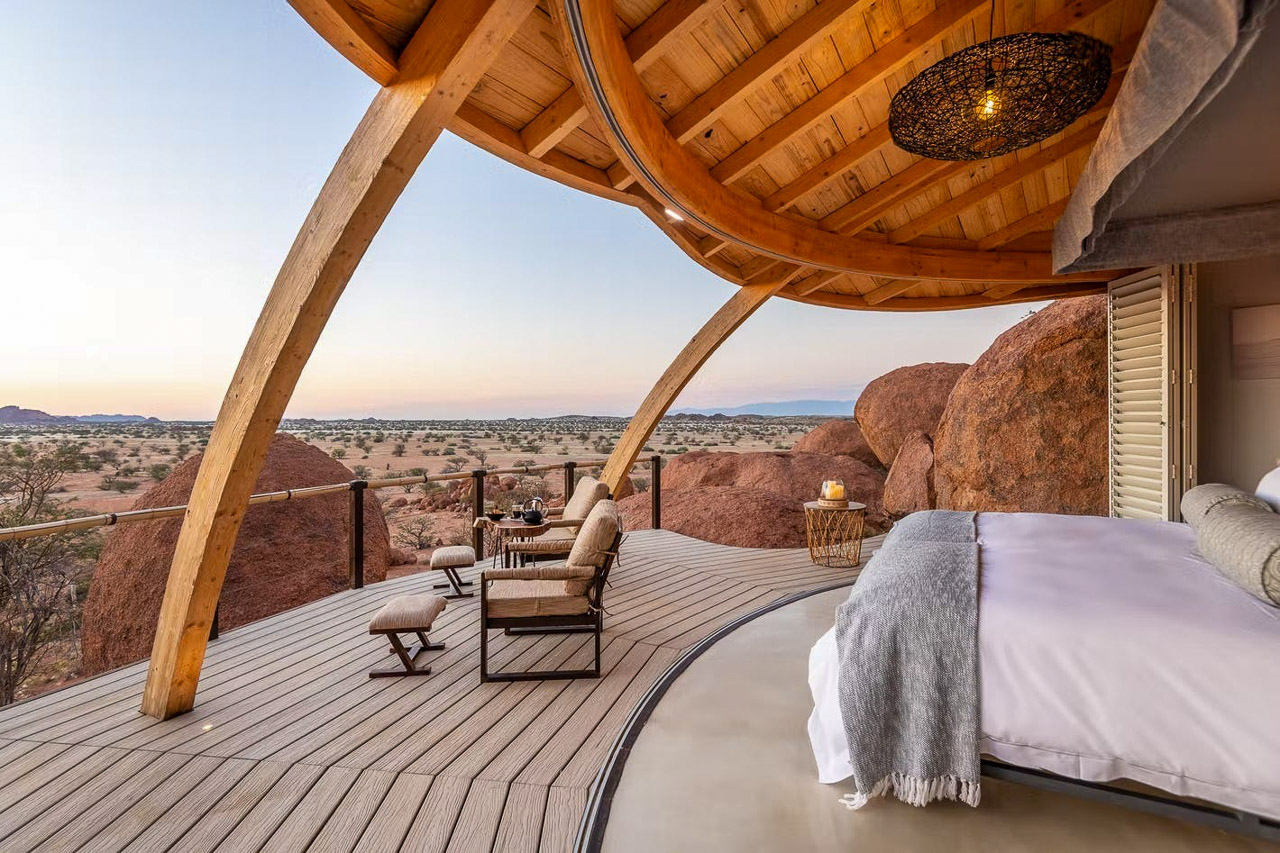

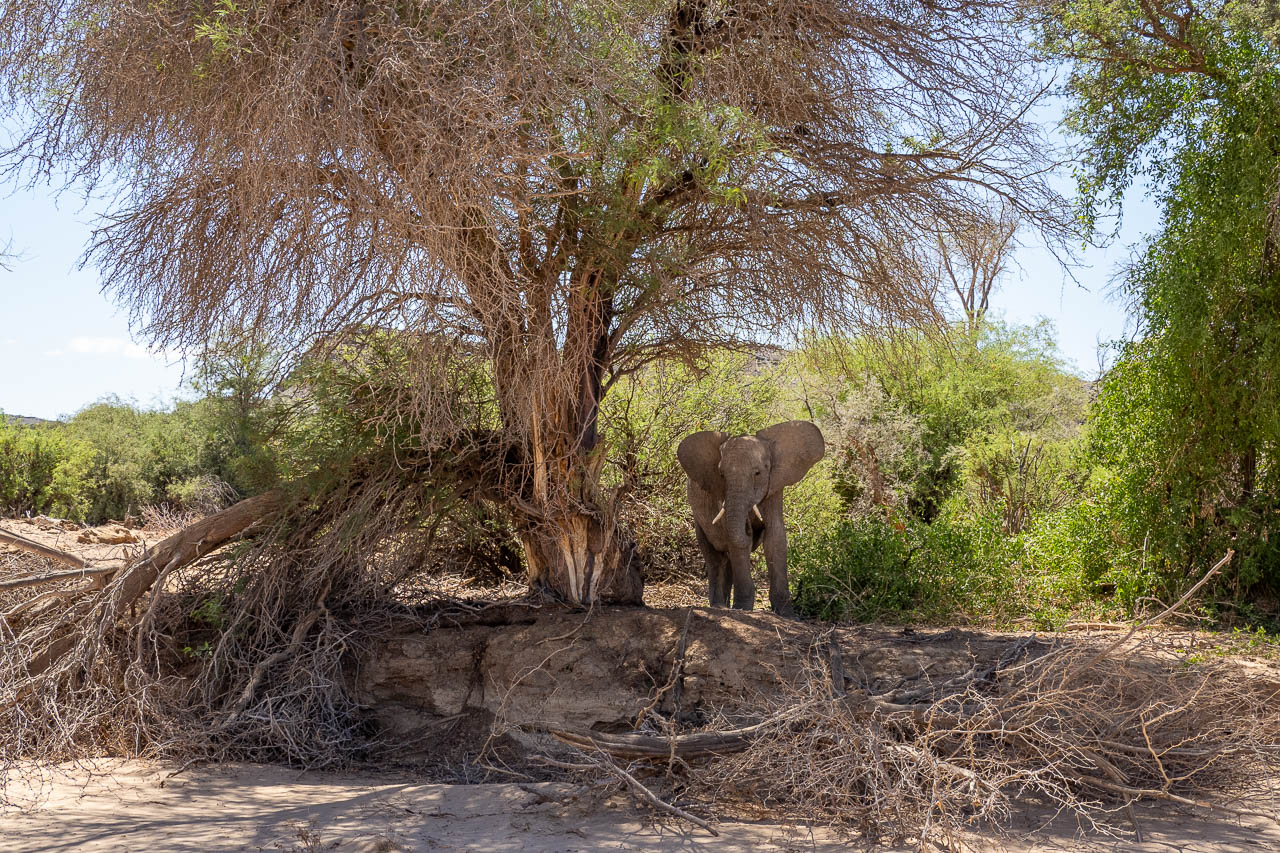
Accommodation
Onduli Ridge is built at the foot of two granite outcrops that are connected by a ridge. The six suites are cleverly tucked away among the granite boulders that surround the camp and allow mesmerizing views of Namibia's highest mountain, the Brandberg, to the south and the scattered granite inselbergs to the north. Onduli means giraffe in the Oshiwambo language spoken in northern Namibia.
The camp is designed to maximize the views of the extraordinary Damaraland landscape - whether from the bed, the desk or the bathroom. The shutters can be opened completely and the bed can be rolled out onto your private terrace for a night under the starry African sky. The semi-open bathrooms have been skillfully built into the rocks and have a rain shower, flush toilet and washbasin for him and her.
From the Onduli Ridge parking lot, a few steps have to be climbed up to reach the main building. This is where the restaurant, library and tea/coffee station are located. A sandy path leads past the boma to the swimming pool that is well hidden between some rocks. The sundowner deck, where guests meet for drinks in the evening, is just around the last boulder and offers splendid views and the chance to mingle with the other guests. From time to time, the Onduli team organizes a romantic evening under the stars in the boma area, where the popular pizza oven is put into operation.
Families and private groups should also consider the private Onduli Enclave, a privte villa with three suites.
The landscape here consists of rugged hills, dry river valleys in a largely semi-desert and sparse savannah. Besides the famous rock paintings of Twyfelfontein, Onduli Ridge is in close proximity to other geological attractions such as Burnt Mountain, Organ Pipes and Doros Crater. Named after the Crater, Doro !Nawas means "the place where rhinos roam" in the Khoekhoegowab language. The area is home to black rhino, elephant and general plains game, as well as predators like cheetah, leopard, lion, spotted and brown hyena.
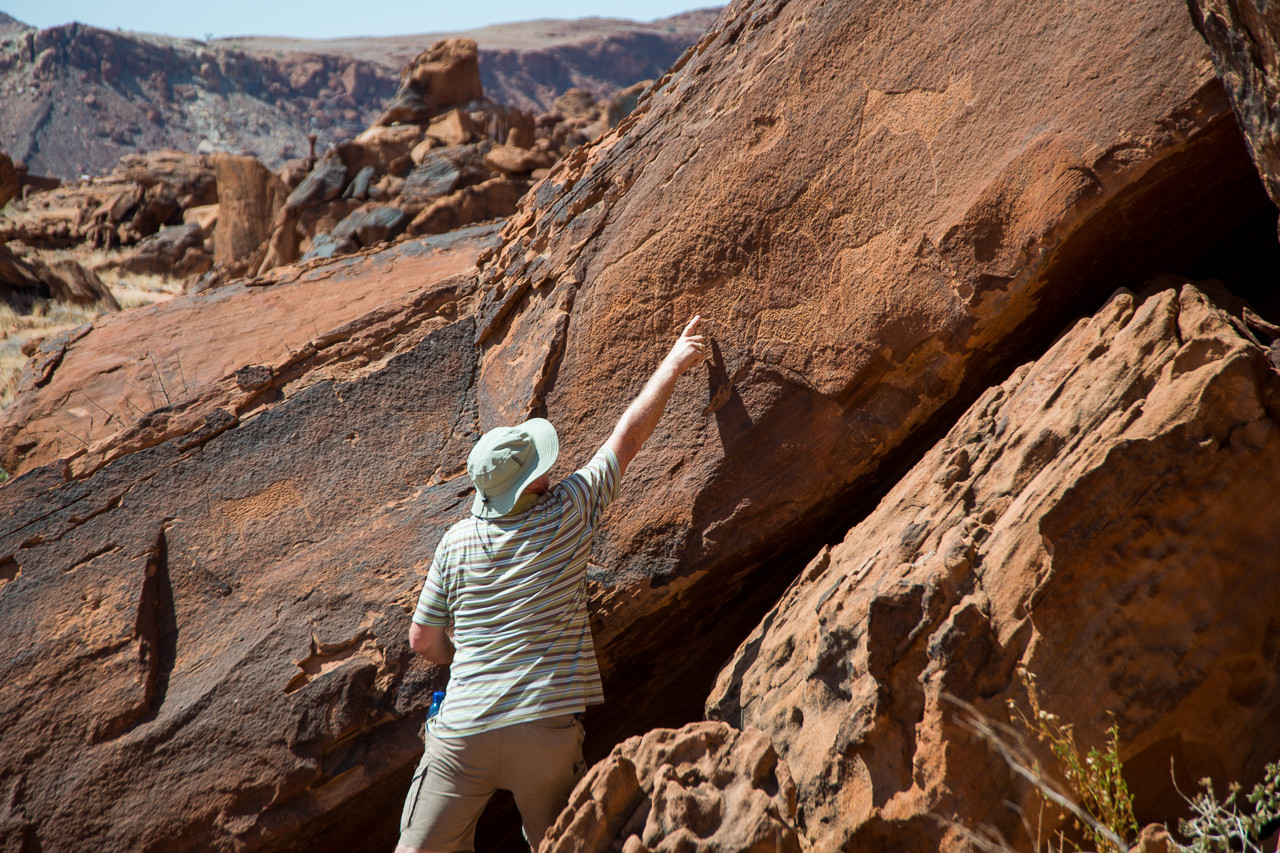
Twyfelfontein was declared a World Heritage Site in 2007 because of its significance as one of the most important sites of African rock engravings. The area is home to one of the few watering holes in the entire region, and one which the local farmers didn’t find particularly reliable: roughly translated, the name Twyfelfontein means ‘sometimes there’s water, sometime’s there isn’t’!
Today, some 40’000 guests from around the globe visit the rock engravings, which has made Twyfelfontein one of Namibia’s destination hotspots and therefore quite busy – visitors can’t expect to have the rock engravings all to themselves.
This region had been familiar to its ancient residents for a long time: they gathered close to the only source of water during the dry season, carried out their rituals, and drew and carved their experiences onto and into the slabs of rock around them. The naturally occurring iron oxide in the sandstone formed a protective layer (the so-called ‘desert varnish’) over the rock engravings. This layer has slowed down the weathering process and allowed us to admire these thousands-of-years-old works of art today. Many of the engravings depict hunting scenes with giraffe, antelope, zebra, ostrich, rhino, elephant and lion – and interestingly enough, also a seal! Humans are rarely depicted. The drawings are often surrounded by geometric patterns.
To avoid contamination and vandalism, guests may only visit the area with a guide, who will highlight the most famous motifs, including the lion with a kink in its tail and the dancing kudu. The tour takes about an hour for the first motifs, and a further hour if you wish to see the rest. It is best to visit in the early morning or late afternoon in order to avoid the worst of the heat.

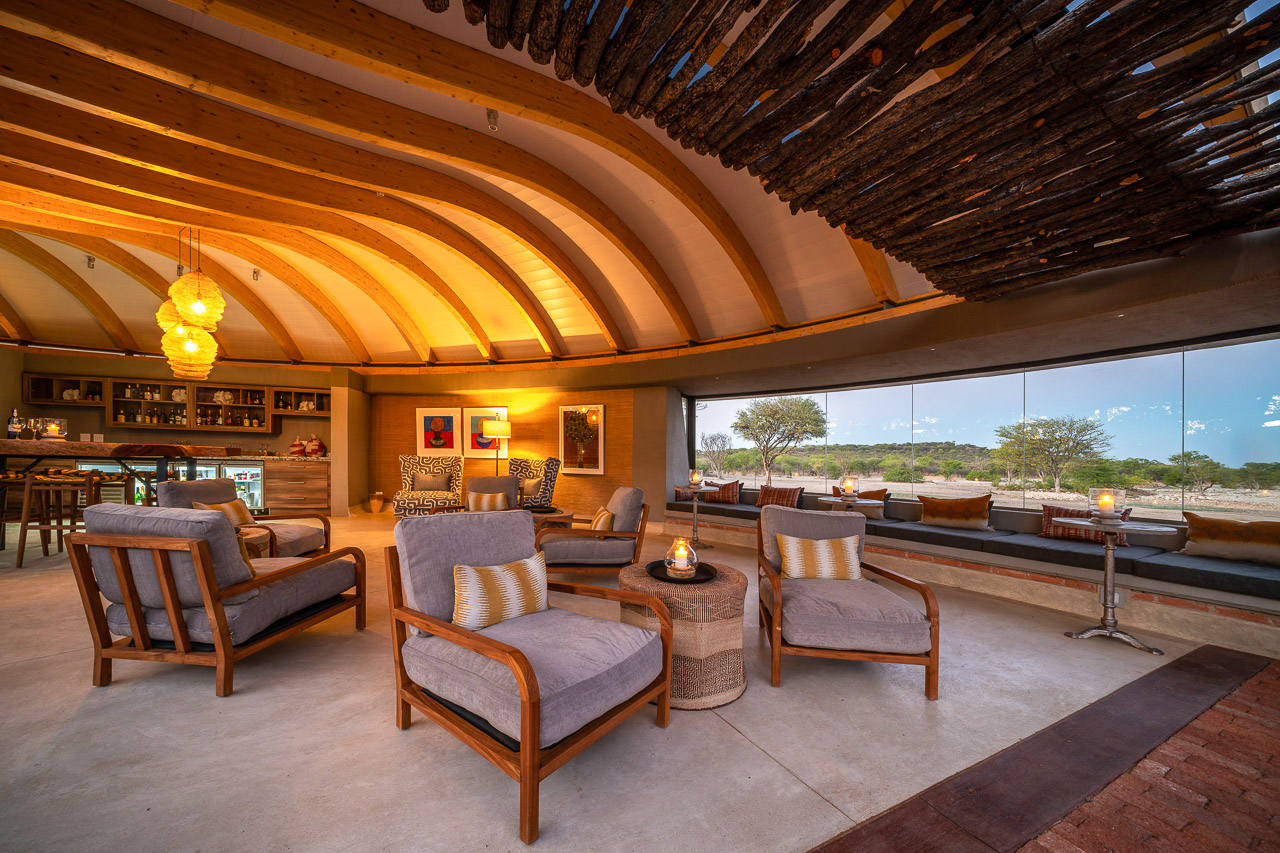
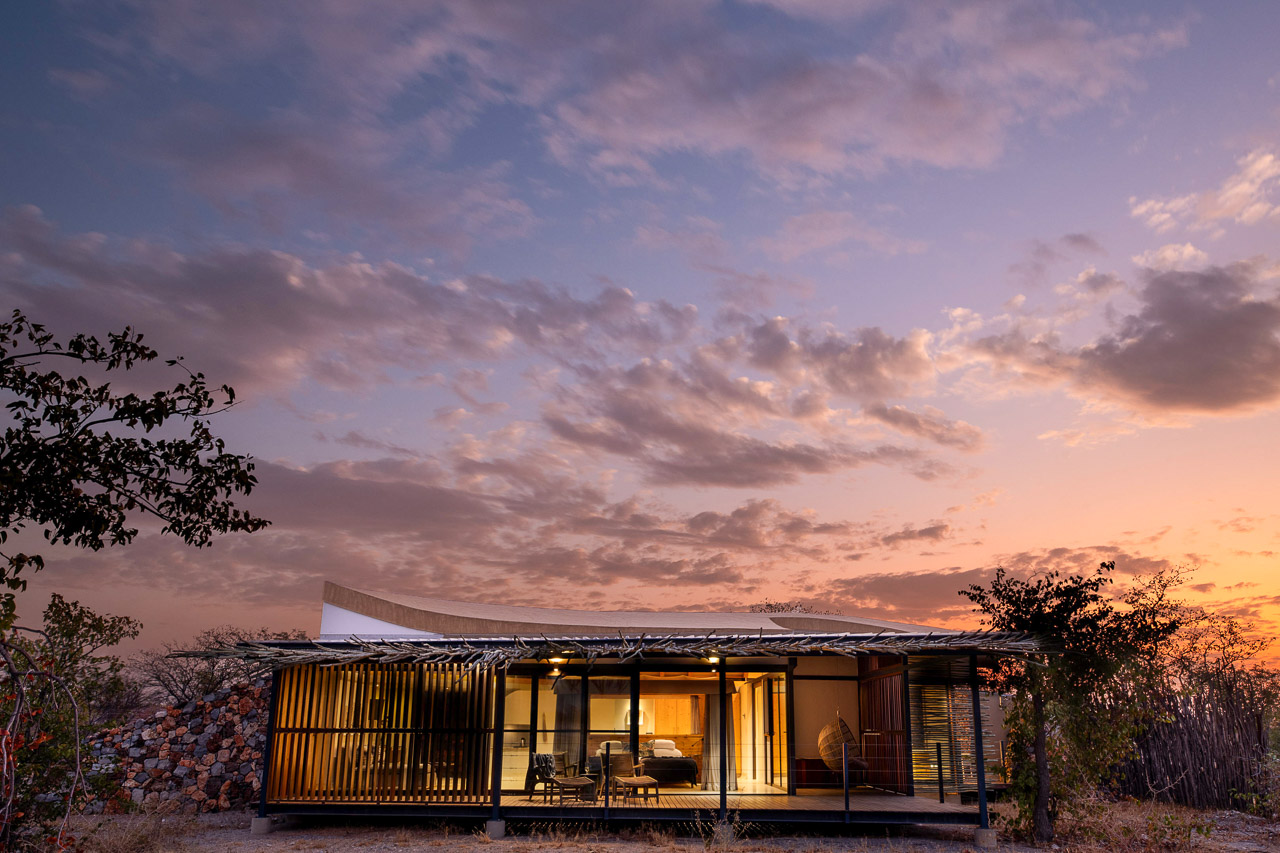
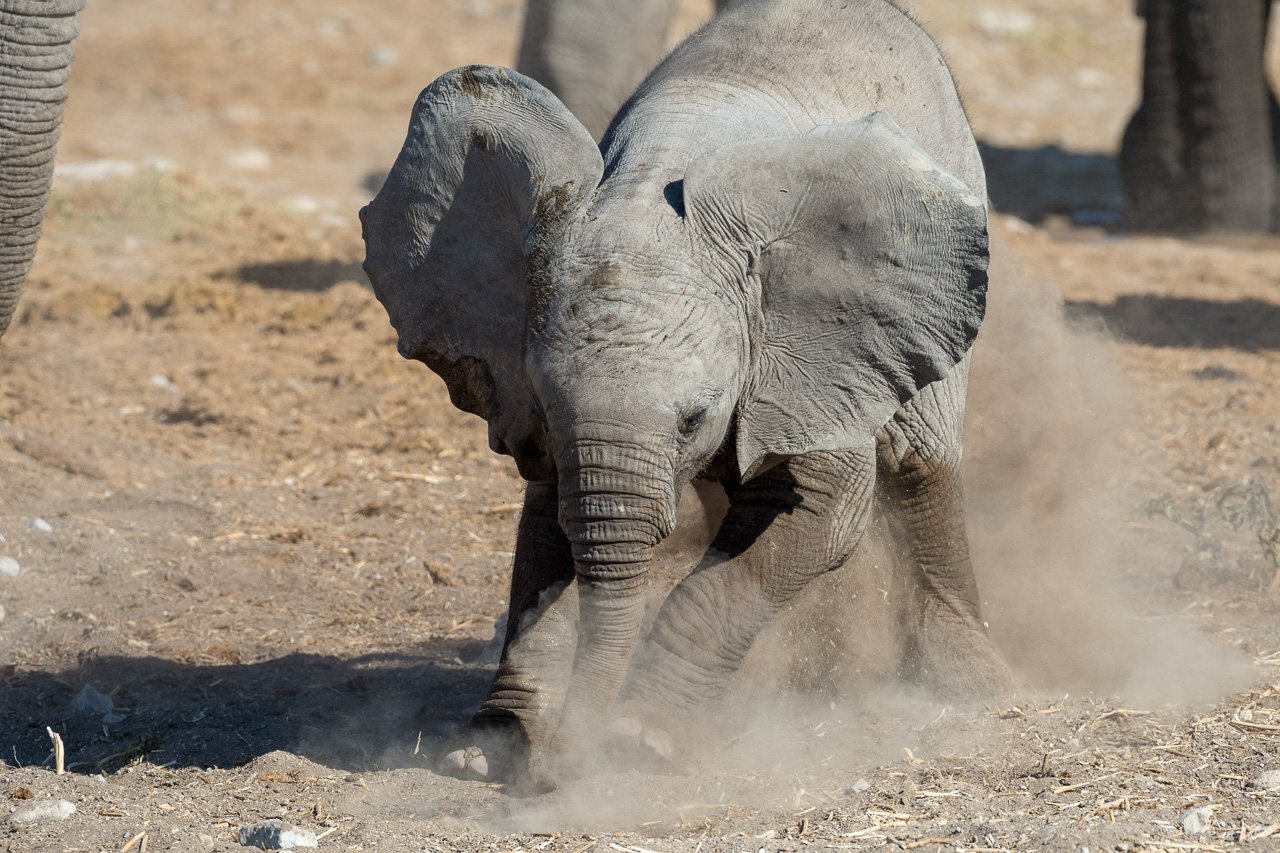
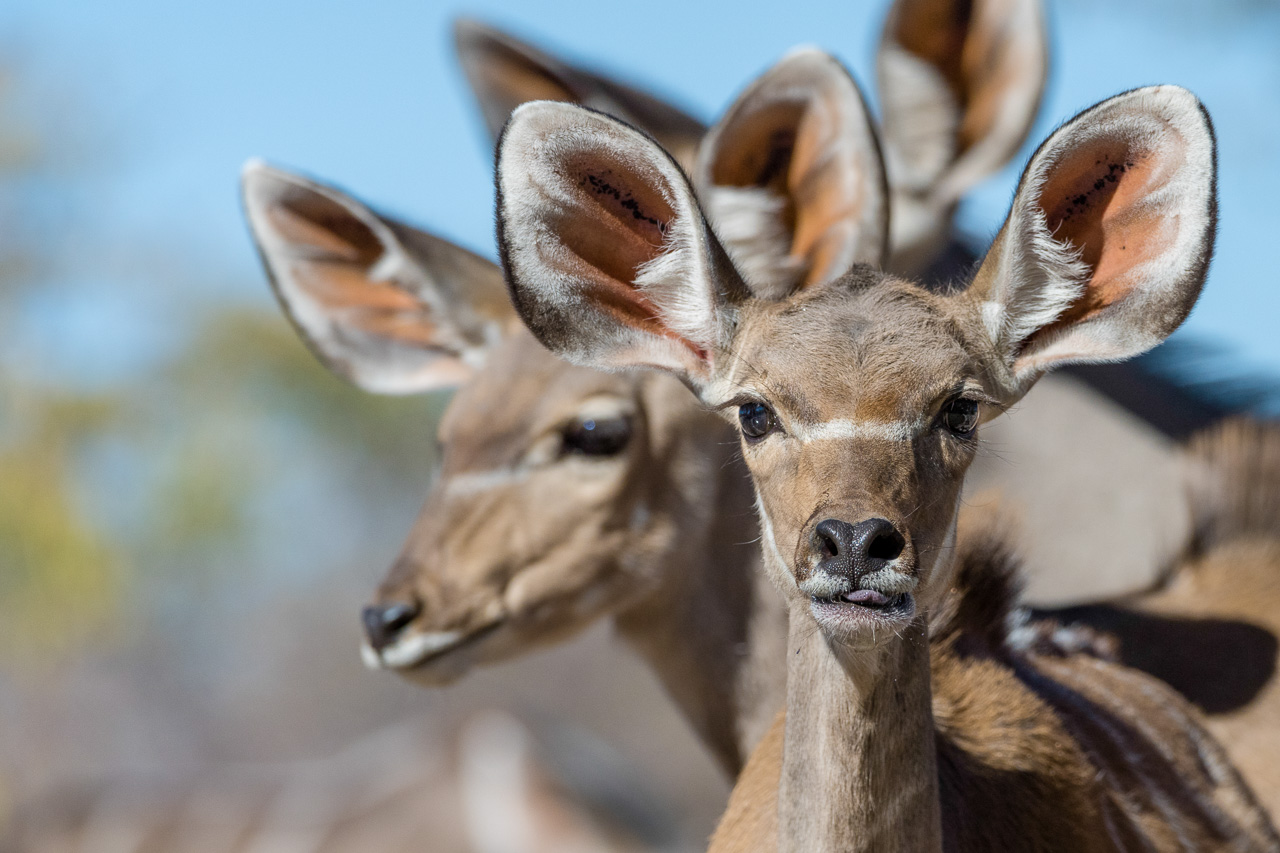
Accommodation
Andersson's Camp is situated in the private Ongava Reserve close to Etosha National Park. The camp offers a very private safari experience with only seven double rooms and one family room. All rooms have en-suite bathrooms, indoor and outdoor shower, air-conditioning and a private viewing deck with 180 degree panorama. The family room consits of two suites (each with it's own bathroom and entrance) that are linked by a short walkway.
The main building features great views of the waterhole in front of camp. Guests can watch the animals from the spacious and comfortable lounge. Should you wish to get even closer, a photographic hide not far from camp offers a water level view of the prolific wild and birdlife. There is also a library, a curio shop, a beautiful infinity pool and a photo lounge, where you can check your own photos and send them to friends (Wi-Fi available).
A highlight of Andersson's Camp is the Ongava Research Centre. Researchers and scientists have their working space here and you are invited to visit the exhibition area and attend the interactive presentations in the auditorium.
Ongava Tented Camp, Little Ongava and Ongava Lodge are also situated in the Ongava Game Reserve.
The Etosha National Park is one of the most important nature reserves in southern Africa. It exists since 1907 and covers an area of 22,270 km². The central and eastern sections consist mainly of various silvery-white shining salt pans, which have made Etosha famous. In the dry season the park, the animals and the vehicles are covered in a whitish haze of salt dust.
On the southern shore of the huge Etosha Pan (130 x 50 km) there are several waterholes, which magically attract the animals from the surrounding area during the dry season. The three large state camps Okaukuejo, Halali and Namutoni connect Anderson's Gate in the south with the von Lindequist Gate in the east. The western part towards Galton Gate is much more wooded and less frequented by visitors, but it also offers less trails to drive around and find wildlife.
Etosha National Park is Namibia's premier safari destination. Covering almost the same area as Switzerland, Etosha is one of the largest national parks in Africa. To the west of the park lay the silvery white salt pans and adjoining waterholes, which magically attract all kinds of wildlife during the dry season.
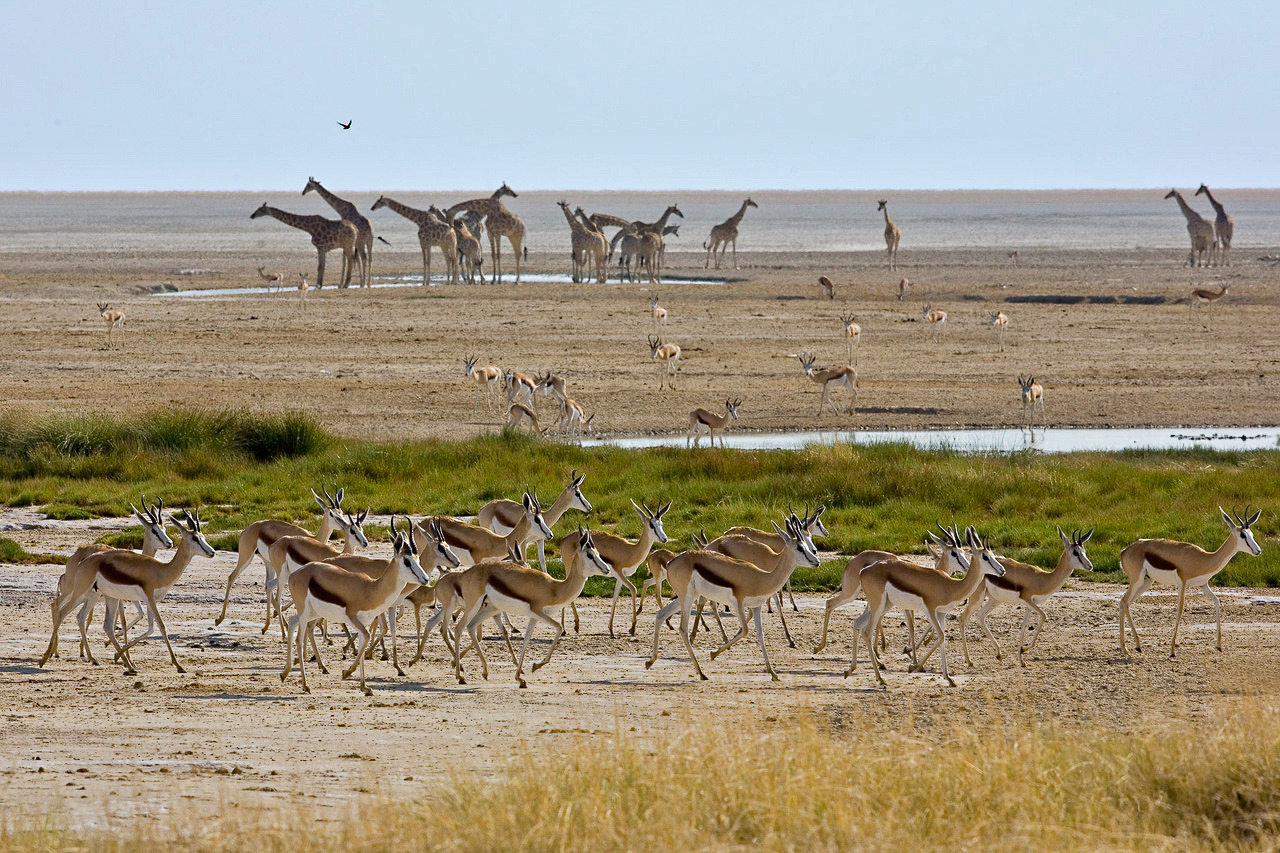
The park thrives mainly on these artificial waterholes, which attract countless animals in the dry season. With the onset of the rainy season, the animals are much less dependent on these waterholes and more difficult to find. The Etosha Pan itself can then contain up to 10 cm of water, and the park becomes more exciting for birdwatchers.
There are a few government camps in the park itself, most of which offer a less favourable experience. The good accommodation is located outside the park in private areas, in the east these are Mushara and Onguma, in the south it is the private Ongava area.
Namutoni and Okaukuejo are the two main camps at the eastern Von Lindequist Gate and the southern entrance to Etosha at Andersson's Gate respectively. The quieter Halali Camp is situated between the two. The state camps are very large and offer chalets, campsites, petrol stations and large picnic areas. If you are looking for a private experience, this is certainly not the place for you. Most of the roads run between these three camps and lead visitors to the various waterholes.
The western part of Etosha opened to visitors in 2011. This part of the park is very different from the area around the Etosha Pan, it has many more bushes and trees, less traffic, but also less to see.
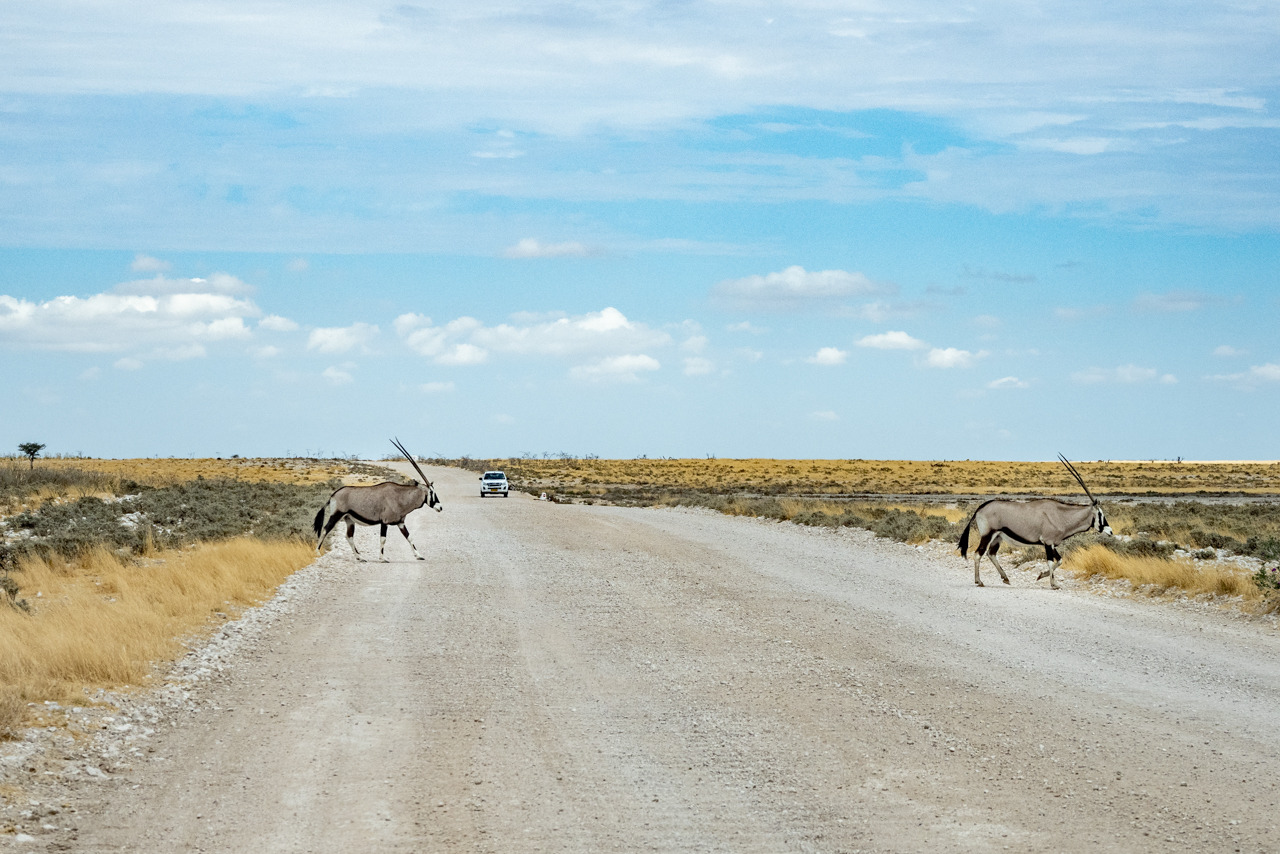
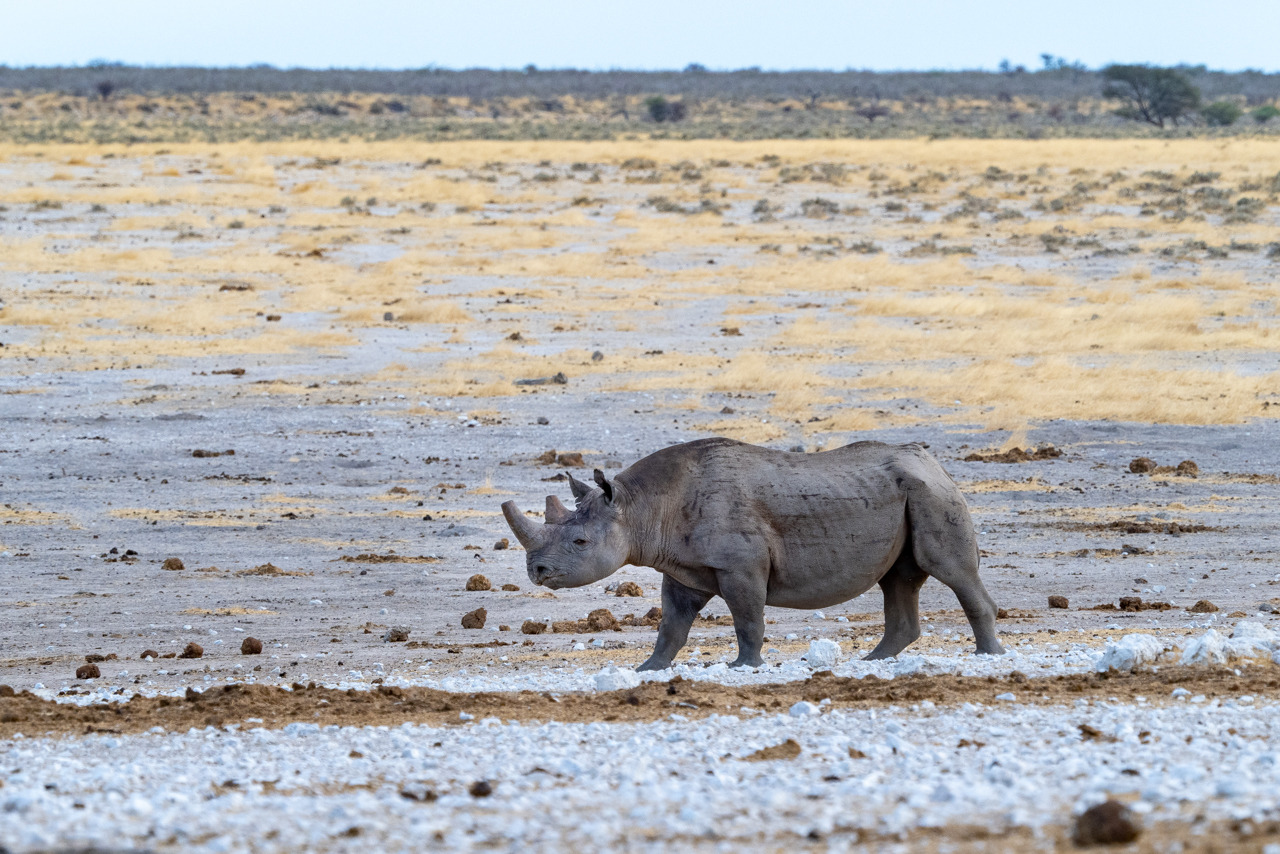
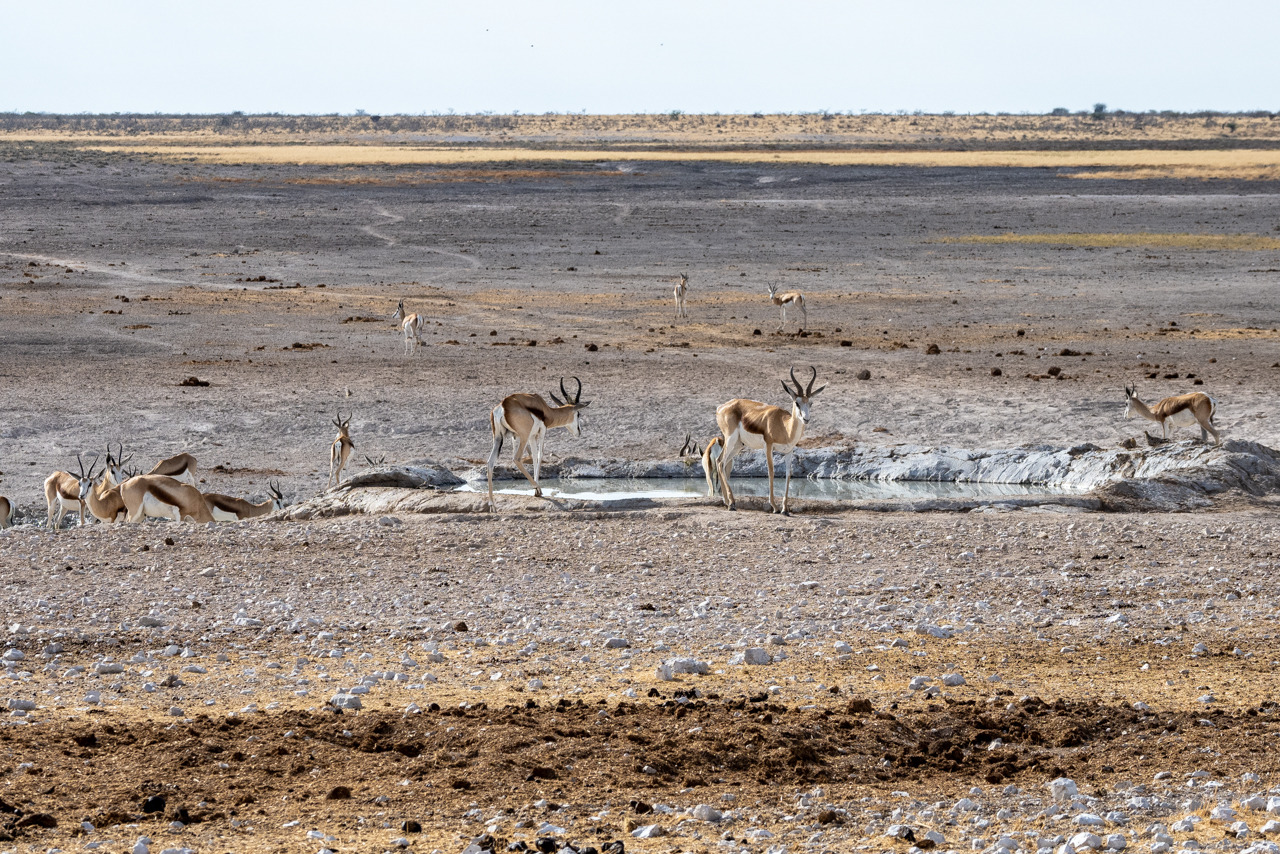
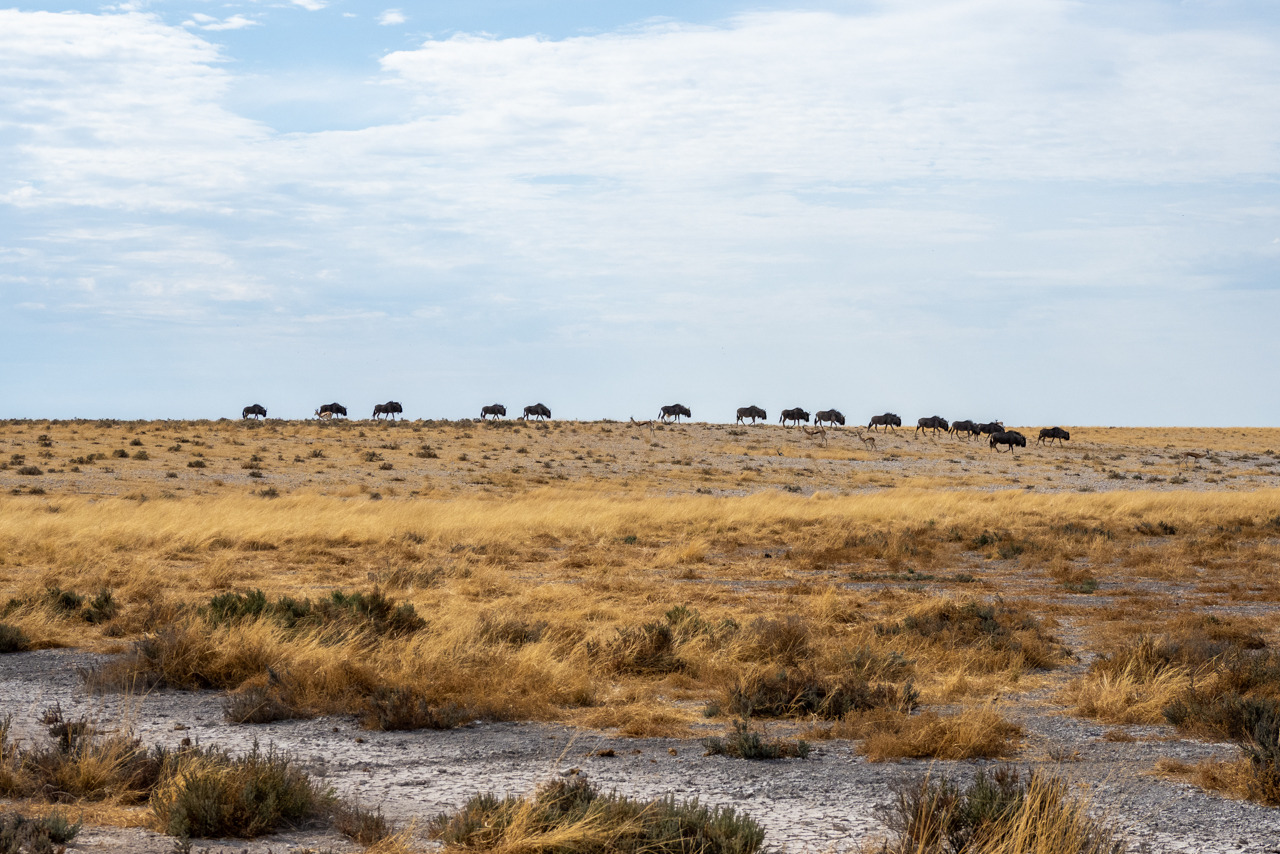
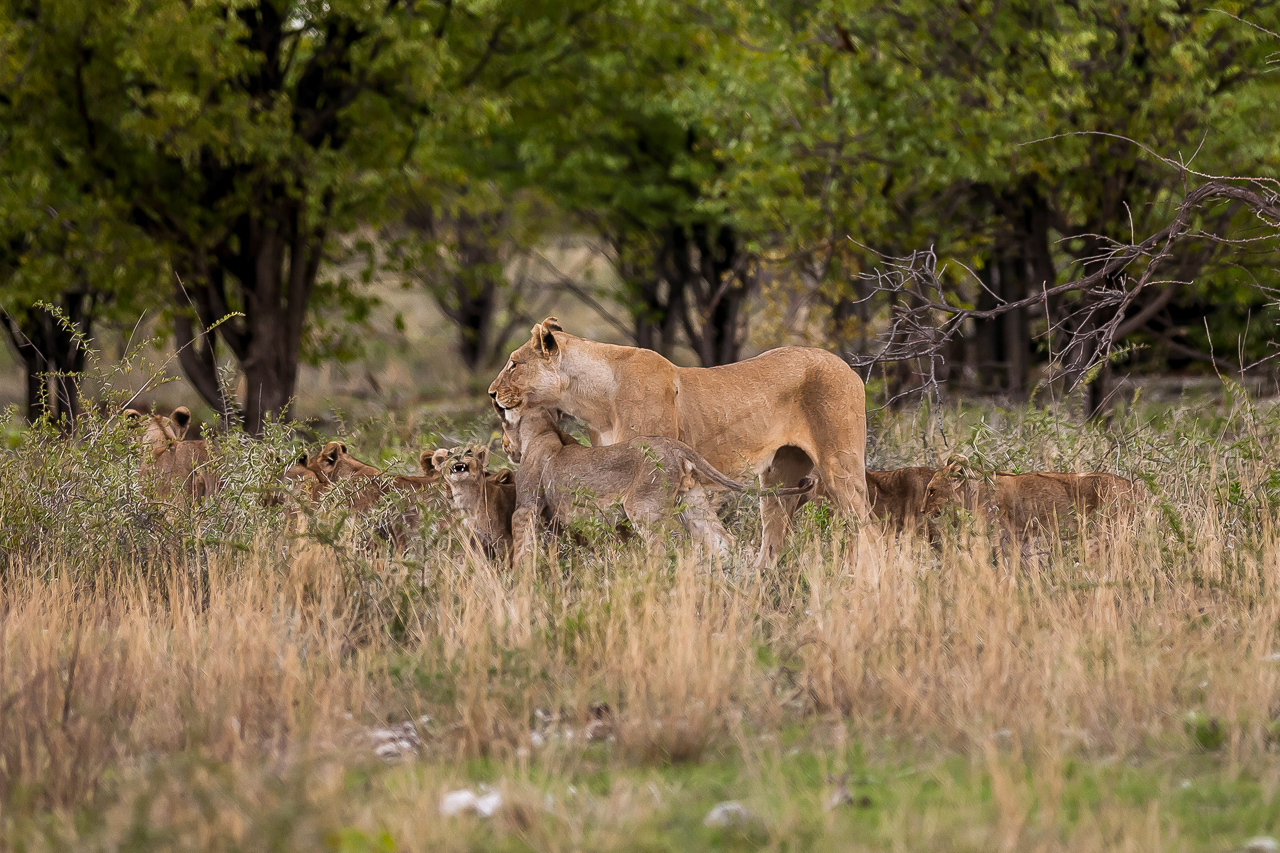
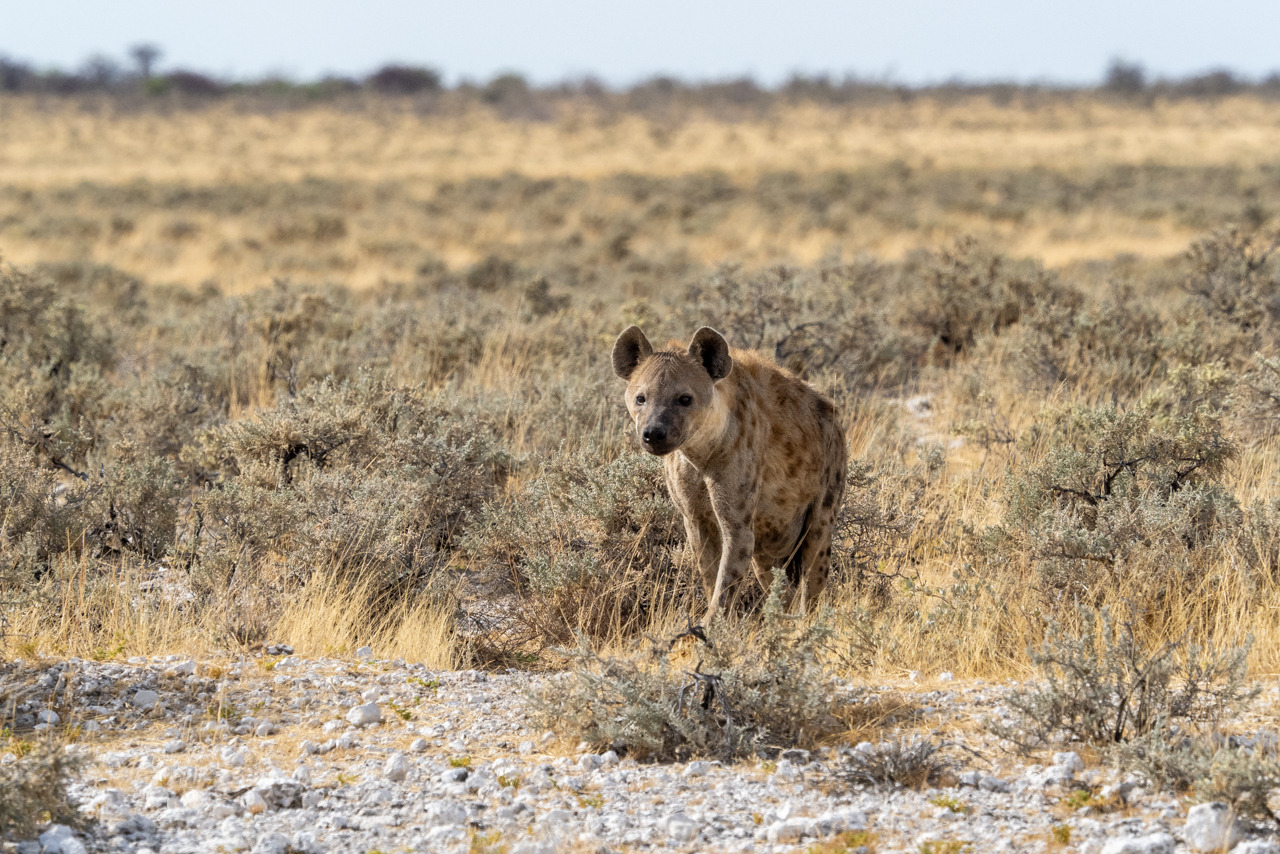

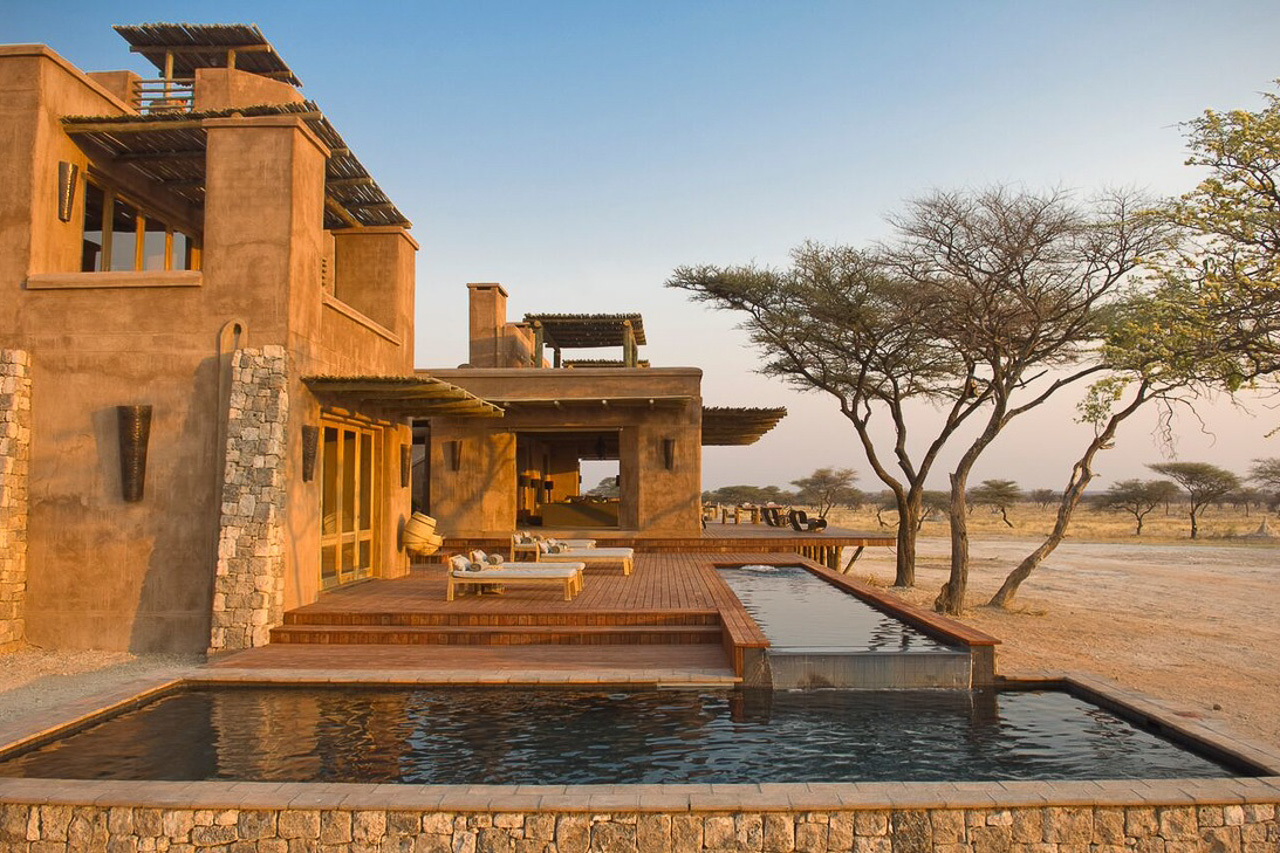
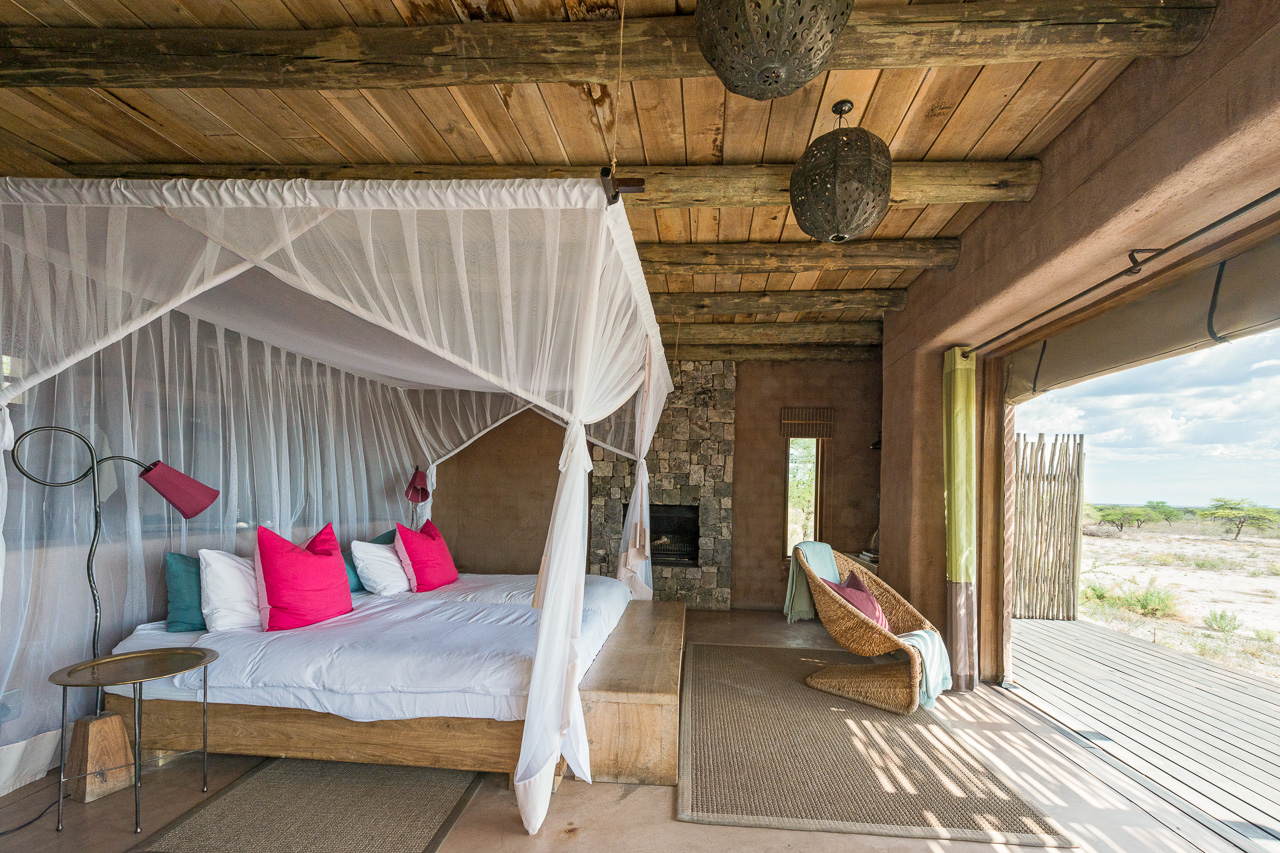
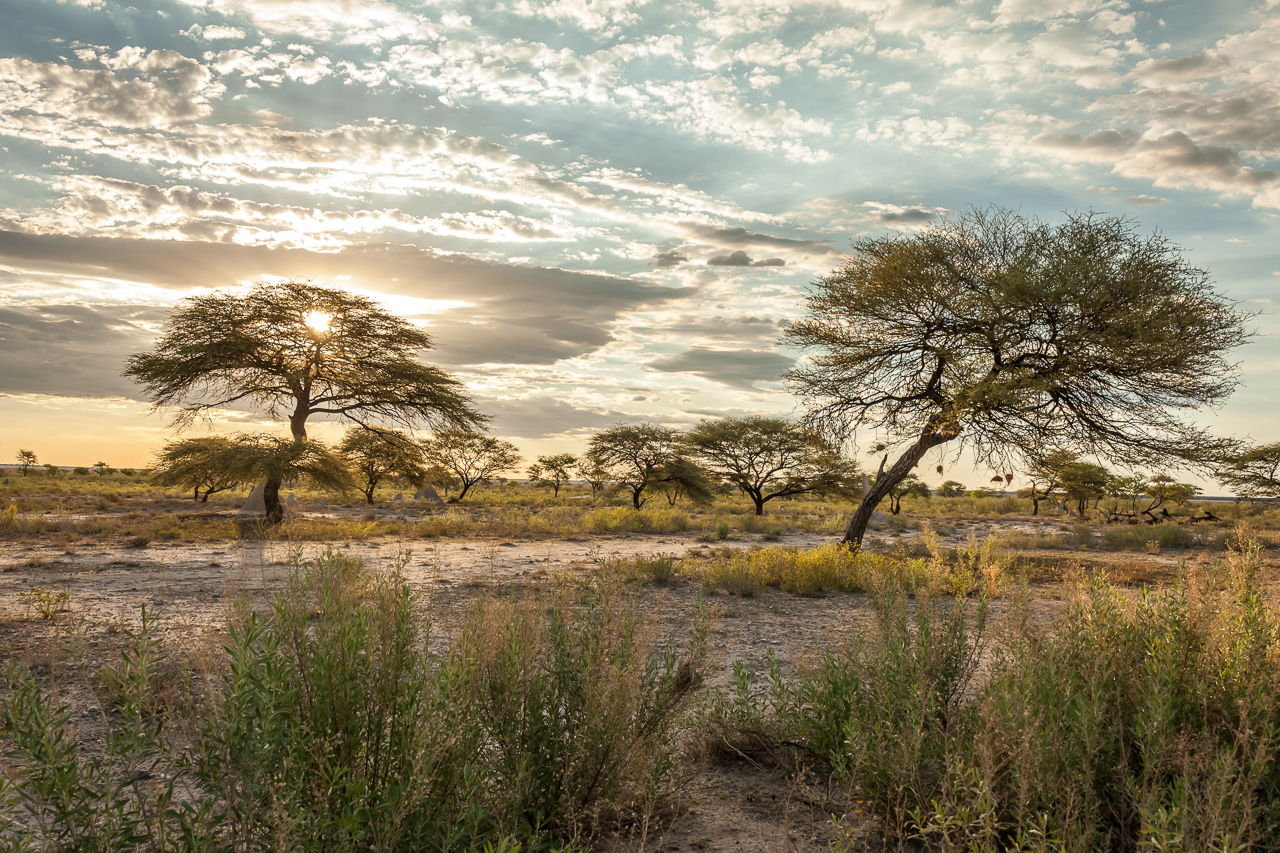
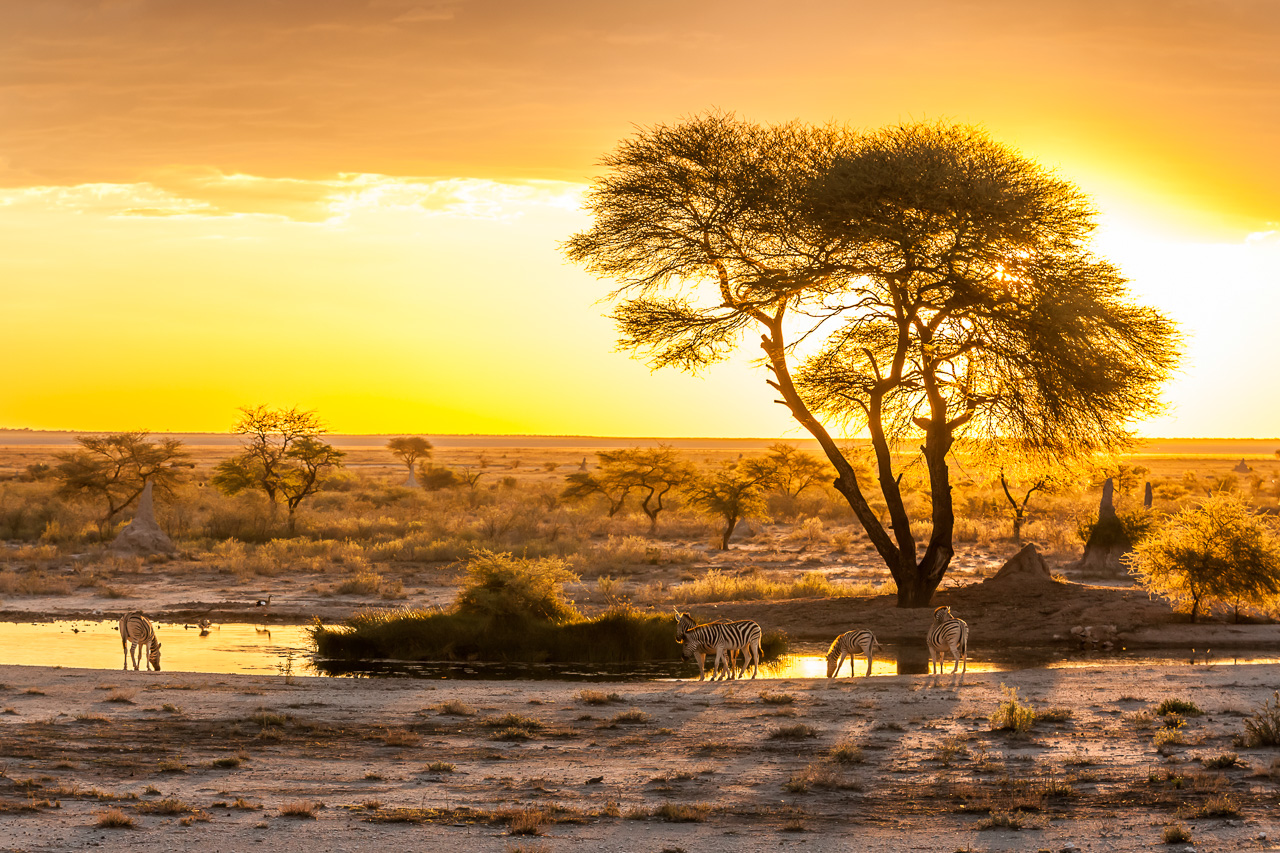
Accommodation
Onguma - The Fort offers twelve air-conditioned bush suites with maximum privacy, spacious bathrooms, indoor and outdoor showers and large terraces. The rugged beauty of the Etosha area and Fisher’s Pan can be enjoyed from anywhere in the camp.
With its tower and integrated antique elements, the huge main building is inspired by a combination of African, Moroccan and Indian architecture. It houses a spacious lounge, restaurant, wine cellar, swimming pool and a plunge pool. The game activities at the waterhole to the front of the lodge can be enjoyed from the pool or whilst having dinner.
Situated in the main building’s largest tower, the Sultan Suite offers a little more of everything and, of course, better views. The Honeymoon Suite is located furthest from the main building and is slightly larger than the standard suites.
The camp is unfenced, which means there is a minimum age requirement for our younger guests. Oddly, one is not allowed to walk to the rooms and transport must be called to get to the main building, even at daylight.
The Etosha National Park is one of the most important nature reserves in southern Africa. It exists since 1907 and covers an area of 22,270 km². The central and eastern sections consist mainly of various silvery-white shining salt pans, which have made Etosha famous. In the dry season the park, the animals and the vehicles are covered in a whitish haze of salt dust.
On the southern shore of the huge Etosha Pan (130 x 50 km) there are several waterholes, which magically attract the animals from the surrounding area during the dry season. The three large state camps Okaukuejo, Halali and Namutoni connect Anderson's Gate in the south with the von Lindequist Gate in the east. The western part towards Galton Gate is much more wooded and less frequented by visitors, but it also offers less trails to drive around and find wildlife.
Etosha National Park is Namibia's premier safari destination. Covering almost the same area as Switzerland, Etosha is one of the largest national parks in Africa. To the west of the park lay the silvery white salt pans and adjoining waterholes, which magically attract all kinds of wildlife during the dry season.

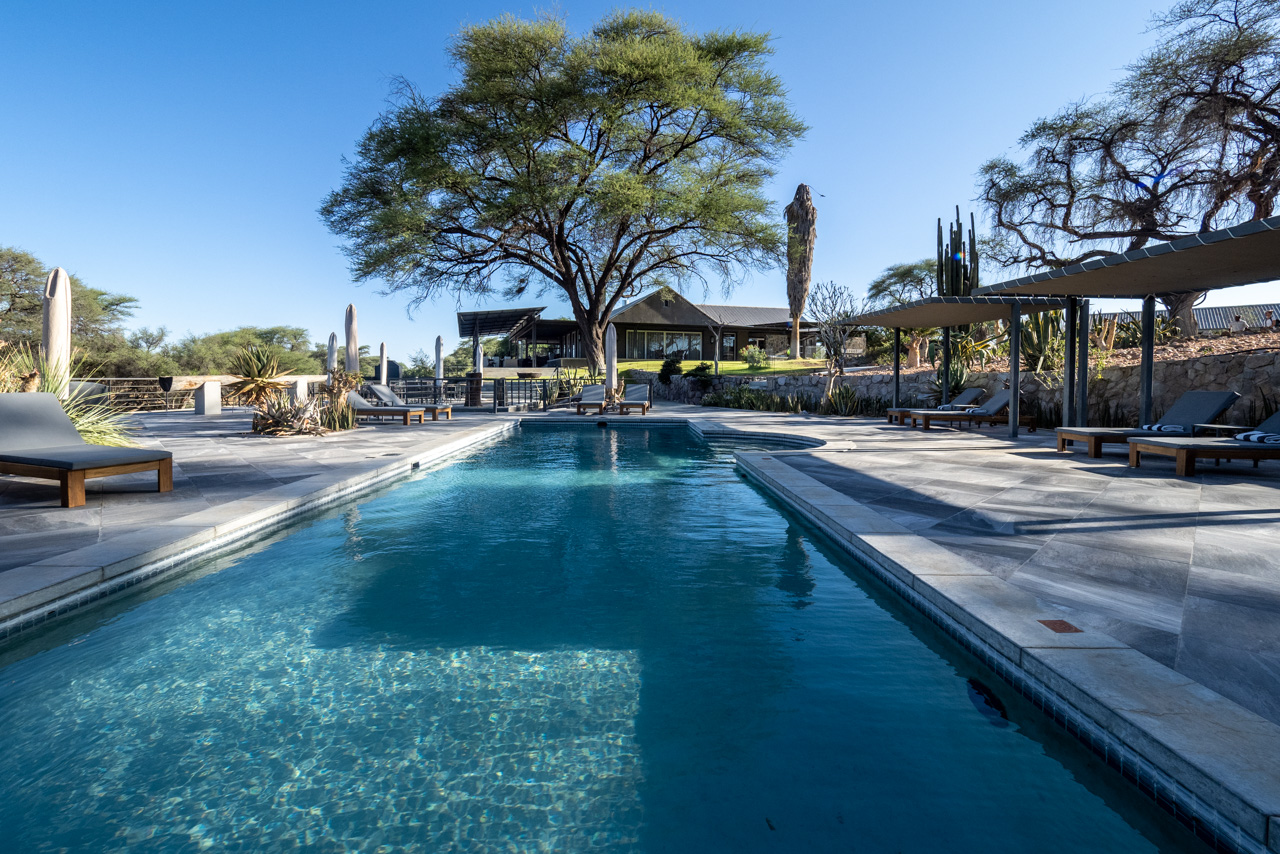
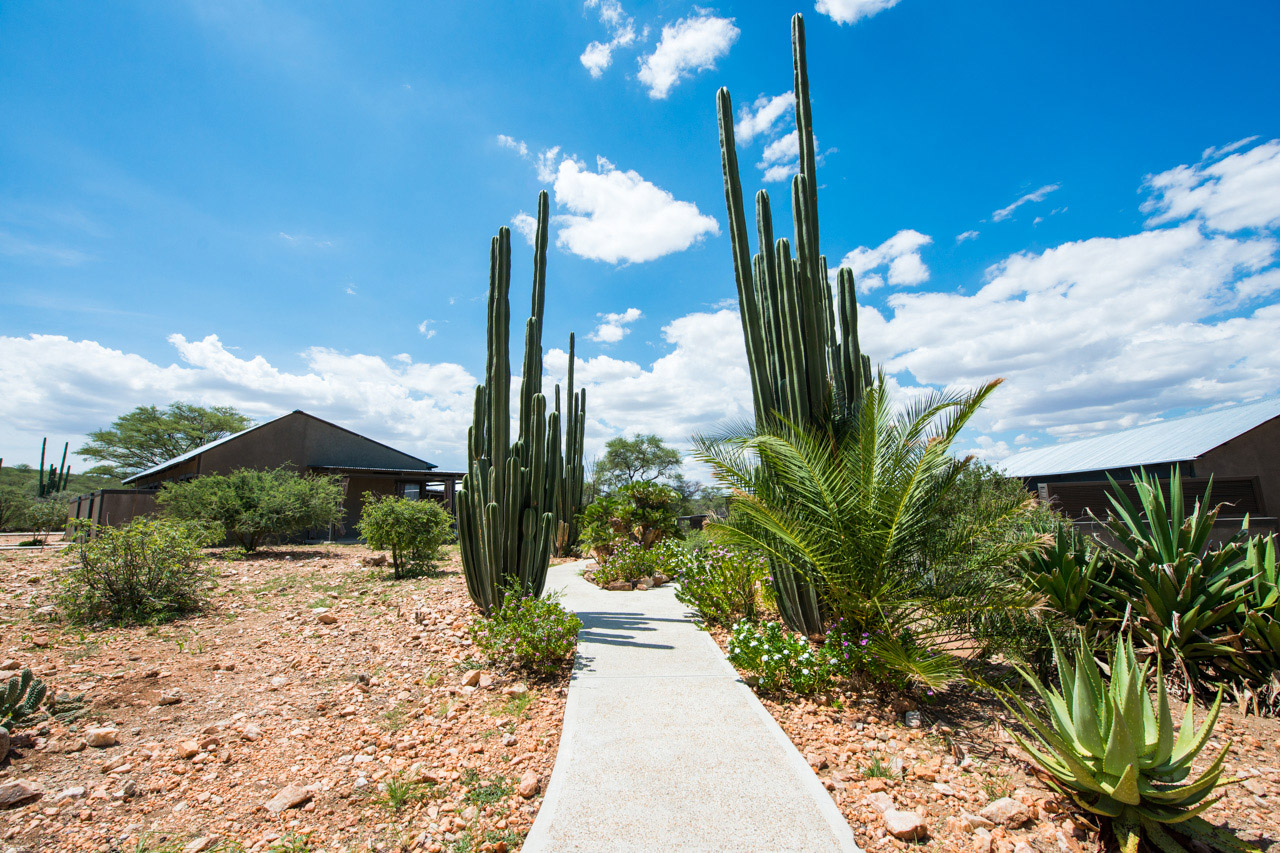
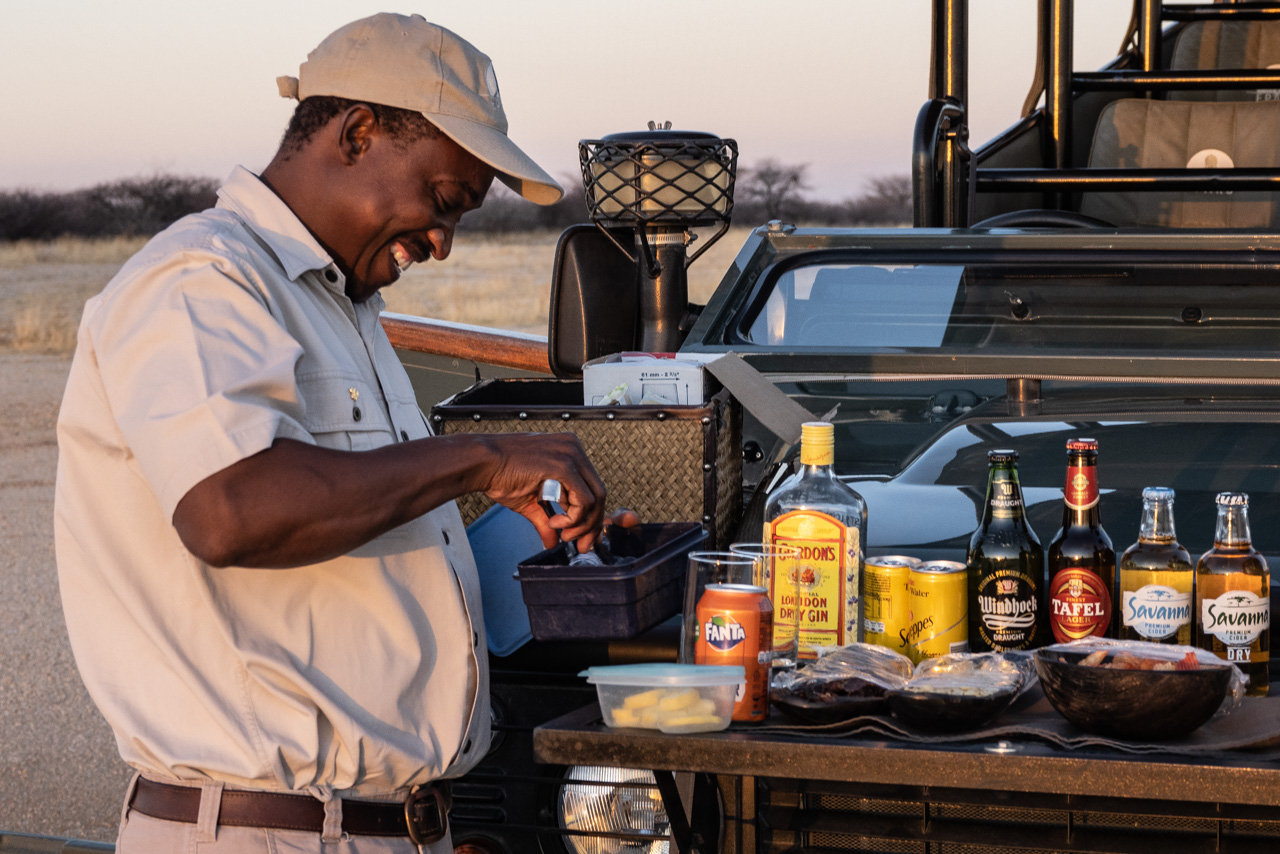
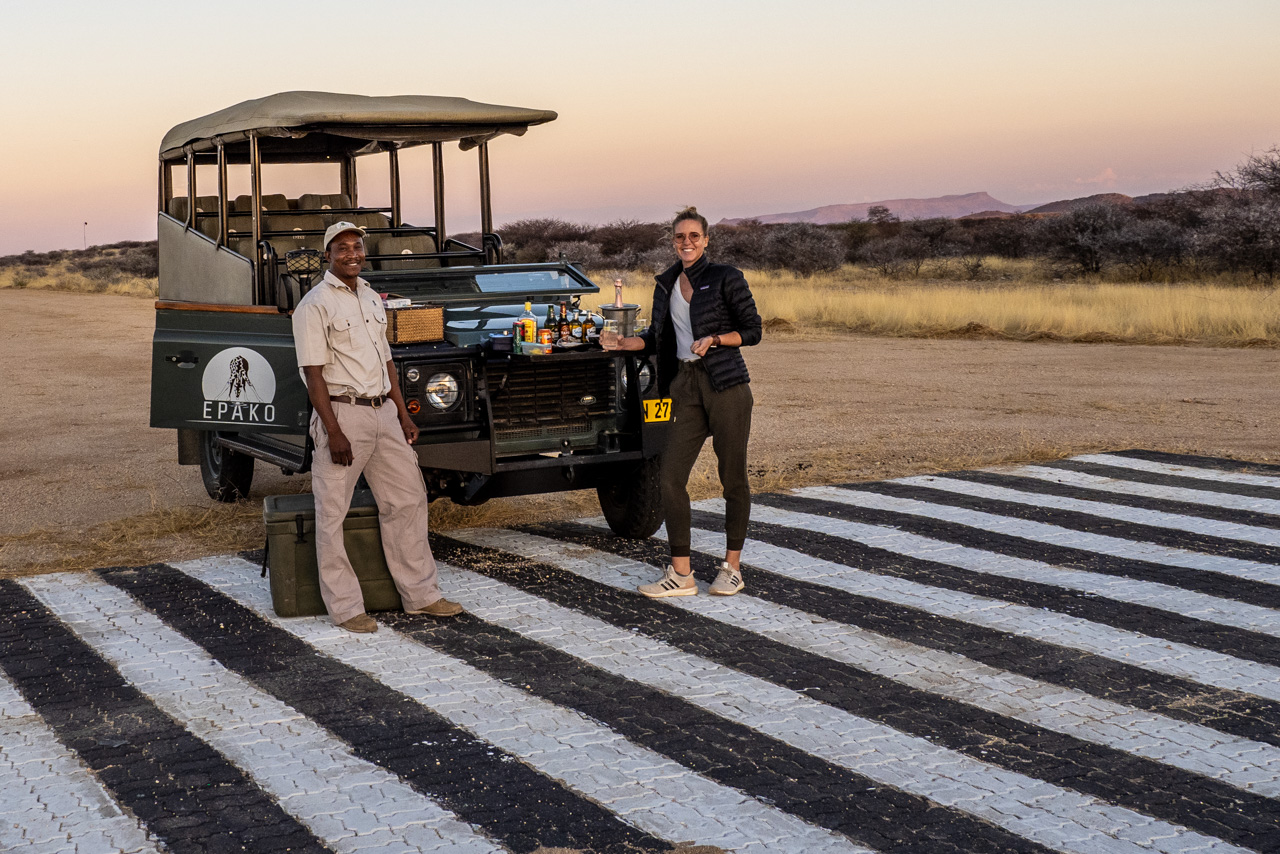
Accommodation
Epako offers ten rooms and accommodates a maximum of 20 guests. Set within a breathtaking 11,000 hectare private reserve which is only accessible to Epako guests, your stay at Epako will be a very private experience. The lodge was built directly on the bank of the dry riverbed of the Epako and has a slightly elevated position with a view of the riverbed and the waterhole opposite.
Epako is an elegant lodge with attentive and friendly service and we enjoyed excellent food on several visits. The ten very stylish rooms are spread over two buildings and include six deluxe rooms, two junior suites and two suites. The two buildings are based on the design of traditional farmhouses and have a large balcony leading around the house.
All rooms have en-suite bathrooms and a terrace with deck chairs. The Junior Suites also have a bathtub, outdoor shower and lounge. The Waterhole Suite and the River Suite (150m2 each) are about twice the size and have a private dining table for those guests who like to stay among themselves. The Waterhole Suite offers views and direct access to the pool and is ideal for families in combination with a Deluxe Room. The River Suite offers the greatest privacy and views of the river bend. Most of the rooms can be connected to larger units via double soundproof doors.
Wifi is available in all rooms and in the main building.
The restaurant offers local and international dishes and a good selection of wines. In the evening guests often prefer to sit outside on the large terrace and watch the illuminated waterhole while eating. If you wish, you may start the evening by the open fire with a drink. Epako also has a very impressive large pool with deckchairs and a separate spa.
The private reserve has a size of 11,000 hectares, an area larger than Paris. The dry riverbed and the large ana trees remind us of Mana Pools or the Lower Zambezi National Park. The forests are still intact and beautiful thanks to the absence of elephants.
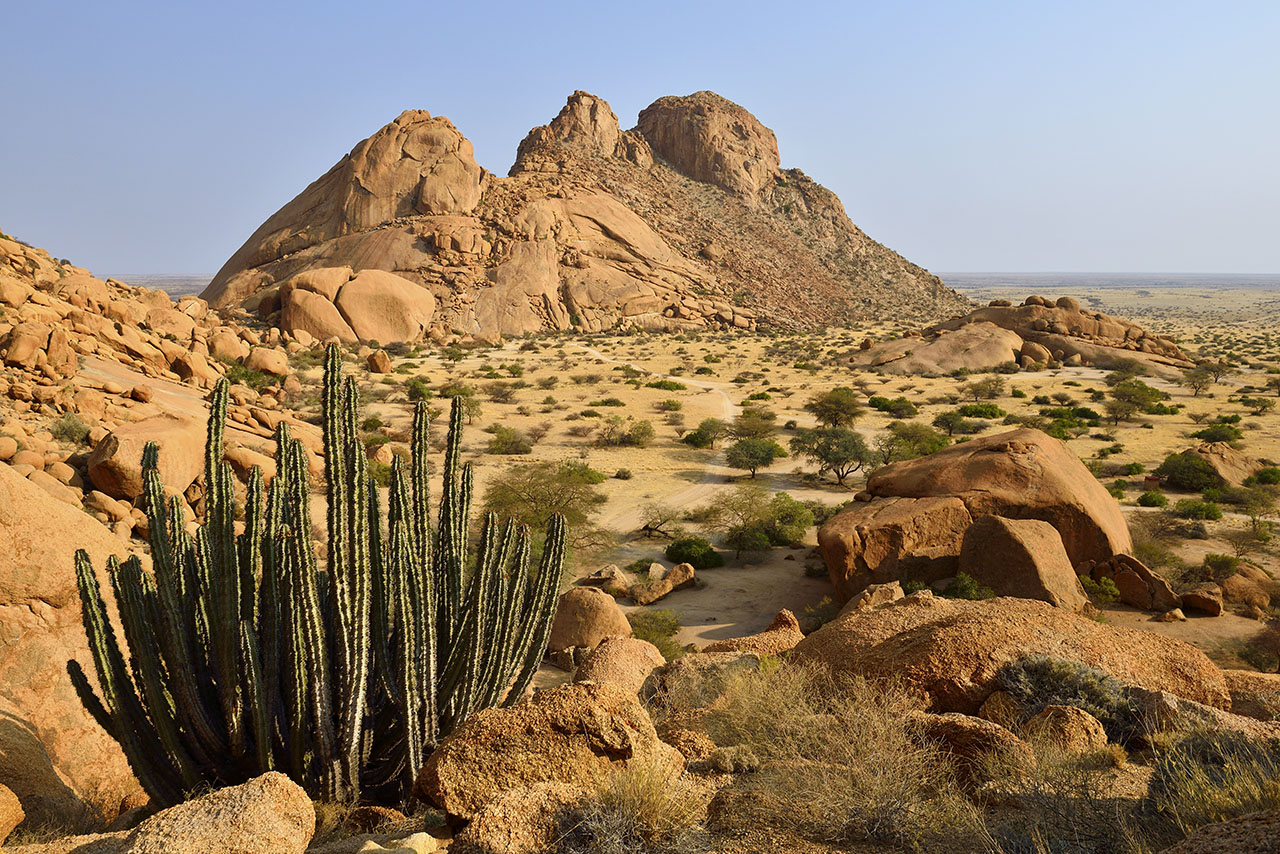
Several sites of cultural interest can be found nearby, including rock paintings. It is also a great place for trekking and rock climbing. The nearby town of Omaruru is exceptionally well-kept and offers some interesting shops.

Basic Information
Individual journey. The journey will be planned on your preferred dates. Self-Drive a rented vehicle.
Duration 14 nights. Min 2 guests. Minimum age 6 years. Trip vice versa possible.
Includes all transfers from Windhoek to the hotels/camps to Windhoek
- Olive Exclusive: Junior Suite. Breakfast.
- Little Kulala: Standard Room. All meals, drinks (except premier brands), laundry service, twice daily shared activities with one of the camp guides. Includes guided excursion to the Sossusvlei dunes and balloon
- Strand Hotel: Luxury Room. Breakfast.
- Onduli Ridge: Standard Room. All meals, drinks (except premier brands), laundry service, twice daily shared activities with one of the camp guides.
- Andersson's Camp: Standard Room. All meals. Game Drives on your own or bookable at the lodge.
- Onguma The Fort: Bush Suite. Dinner, breakfast. Game Drives on your own or bookable at the lodge.
- Epako Safari Lodge: Deluxe Room. All meals, drinks (except premier brands), twice daily shared activities with one of the camp guides.
Learn more about these areas












